Commencement speakers urge graduates to embrace nuance
Yahya Aliyu believes that there is nothing more dangerous than a rigid mindset.
The master’s of bioengineering and biomedical engineering graduate, said his father, an immigrant from Nigeria, had earned his degree from the Milken Institute School of Public Health on the same stage 25 years ago. As he spoke before GW graduates on the National Mall in his own student address at University Commencement decades later, Aliyu said graduates must rectify universities’ positions as places for intellectual inquiry, free from the “shackles” of ignorance and prejudice.
Aliyu said GW’s goal to uplift people with a common dream of furthering humanity and pursuing higher learning hasn’t changed, but the community has grown more aware of complexities over time, which has created a reality that is hard to grasp.
“We cannot resort to abandoning nuance and painting the world black and white,” Aliyu said during his address on a stage before the Washington Monument. “Such simplifications have yielded innumerable tragedies throughout history, and I need no outside examples.”
University Commencement comes more than a week after local police cleared an encampment that demonstrators from across the D.C. region erected in University Yard late last month to call on the University to divest from Israel and protect pro-Palestinian speech. At the ceremony, graduates garnished their graduation gowns with keffiyehs, raised red-painted hands and waved signs with messages condemning officials for their response to the demonstration. GW officials like Board of Trustees Chair Grace Speights and University President Ellen Granberg received choruses of boos from the graduates section as they entered the event and throughout consecutive addresses.
Aliyu said the allegiances of the Class of 2024 must rise above nation, tribe, class and race, and called for a “world perspective” that develops a society that can live with its conscience.
“The most important revolution we will ever stage is internal,” he said. “We must come to embody the change we wish to see in this world.”
At least 100 students exited the ceremony during Granberg’s address, chanting “walk out for Palestine” as they joined students who gathered outside the National Museum of African American History and Culture to protest against the war in
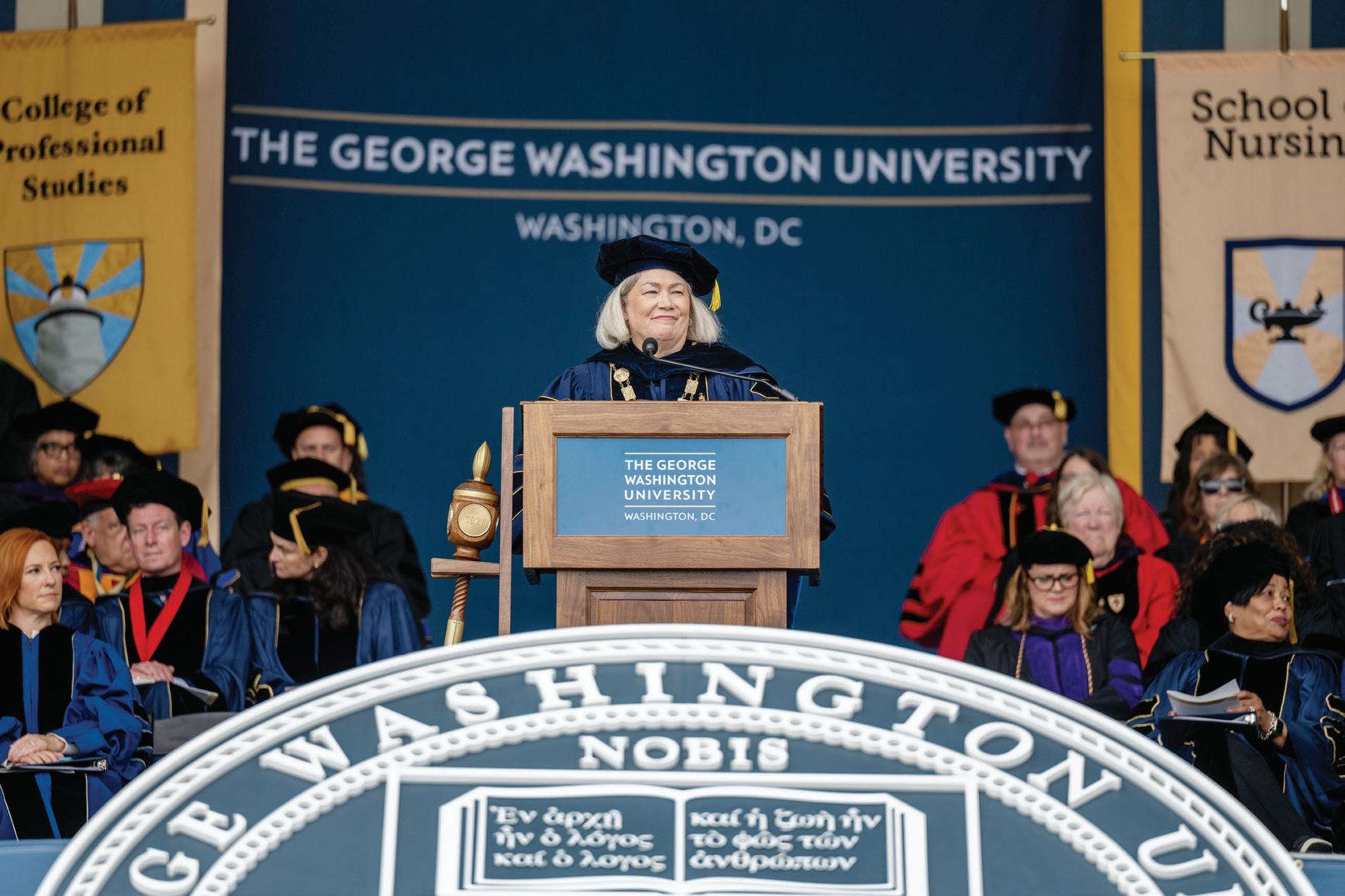
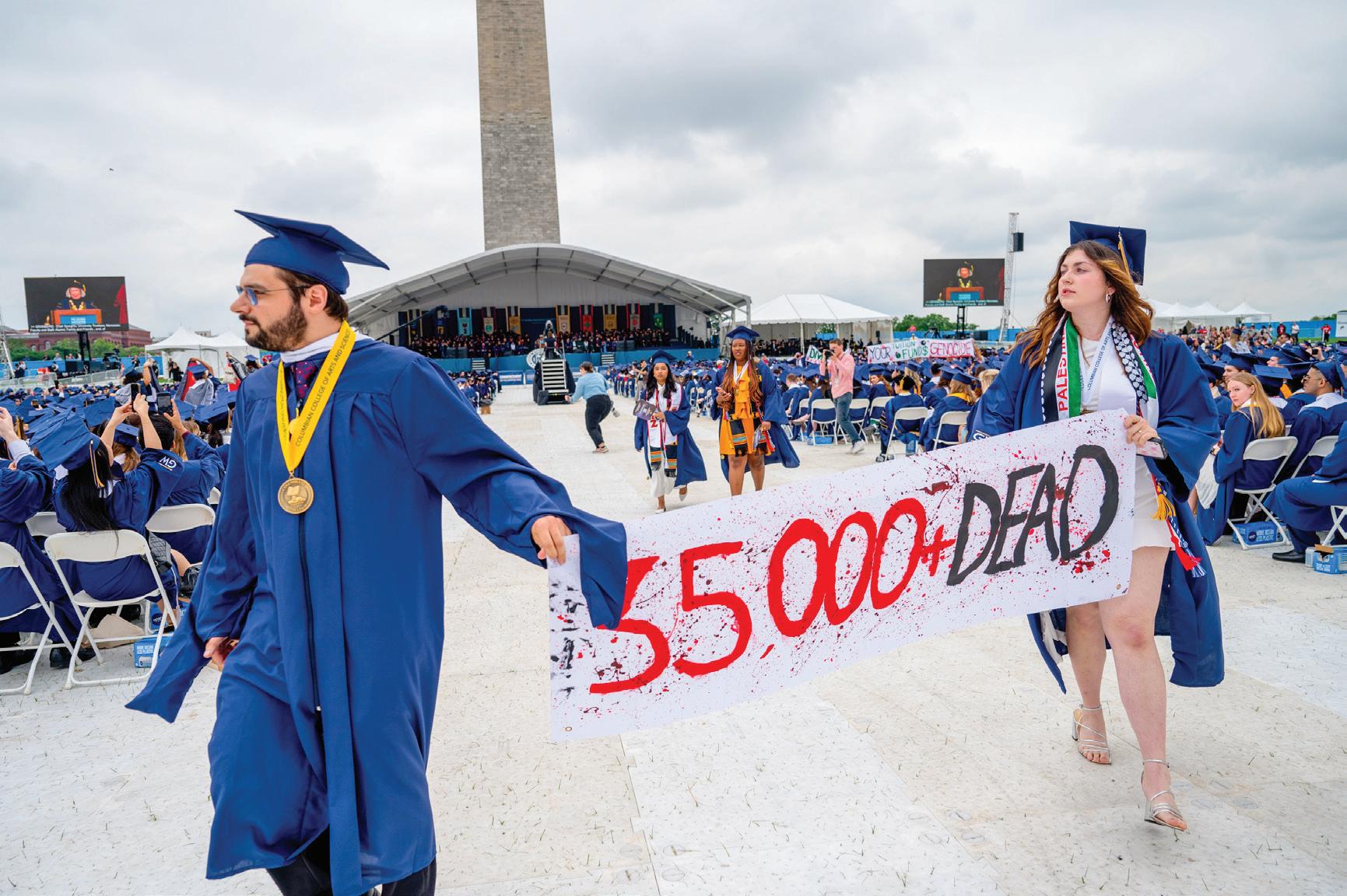
Gaza and officials’ handling of the pro-Palestinian demonstrations on campus. Officials announced that amplified sound devices and signage, including posters, banners and flyers, were not allowed at the Commencement earlier this month. Before the ceremony began, officials announced that they would not permit disruptions to the event.
“Graduating Class of 2024 — your successes are many and very,” Granberg said as the stream of protesters filed out of the ceremony. “But you’ve all exemplified the very best at the George Washington University.
As your degrees are conferred today, I hope you each feel an
immense sense of pride and accomplishment.”
Graduates gathered at the back of the graduate section before exiting, chanting “The students united will never be defeated” and “Admin, admin, you’re all cowards, we the students have the power” as Granberg congratulated graduates and welcomed guests to the ceremony. At least 10 Park Police officers were present on 15th Street, when the last group of demonstrators met with their peers at the protest, and did not appear to be escorted out by law enforcement.
One counterprotester, who appeared to be an attendee at the ceremony, stood near the
group and chanted, “If you don’t want to be here, go home.” Other ceremony attendees moved their chairs in front of the protesters who were blocking their view of the stage.
In the aftermath of Granberg’s address and protesters’ walkout, three community members received honorary doctorate degrees of public service: Vincent Gray, the former mayor of D.C. and the Ward 7 D.C. Councilmember, Jonathan Ledecky, a former trustee and Jen Psaki, the keynote speaker and the former White House press secretary under President Joe Biden.
Pro-Palestinian graduates leave ceremony to join protest
About 200 pro-Palestinian demonstrators convened outside of Commencement on the National Mall on Sunday morning to protest the war in Gaza and demand GW divests from companies supplying arms to Israel. Students, some of whom were not graduates, gathered on the corner of Constitution Avenue and 15th Street next to the National History of African American History and Culture at about 10:15 a.m. and were joined by at least 100 graduates who walked out of the ceremony during University President Ellen Granberg’s speech at about 11:15 a.m. The graduates held signs that read “Your tuition funds genocide” and “Divest now,” and were joined by demonstrators from other schools like American and Georgetown universities.
Just feet away from the ongoing Commencement ceremony, demonstrators chanted at the University and administrators for more than two hours, including statements like, “GW, you’re painted red, 5,000 students dead,” “No commencement graduation as usual, in the face of injustice we won’t be neutral,” and “Students students made us proud, shut graduations down.”
Sunday’s protest follows weeks of pro-Palestinian demonstrations on GW’s campus demanding GW divests from companies supplying arms to the Israeli military, including a 13-day encampment in University Yard which led to the arrest of 33 demonstrators, six of whom were GW students.
Israel’s military’s offensive in Gaza continued Sunday as Israeli officials conducted an airstrike that killed 27 people in central Gaza, most of whom where women and children. As of Sunday, more than 35,000 Palestinians have been killed by the Israeli military since Oct. 7.
Protesters also heard from more than half a dozen speakers while University officials, graduates and honored guests spoke at Commencement. Demonstrators shared stories about their family members who live in Gaza, including one demonstrator who said they lost their mother and father and have cousins in Gaza who have been displaced.
The demonstrator said the encampment at GW showed their cousins that people were advocating for them. The demonstrator said they didn’t know what “B.S.” administrators were telling graduates inside the ceremony about their role as future changemakers but said the title was better suited to demonstrators who walked out of Commencement and protested against GW’s ties to Israel amid in the war in Gaza.
Following weeks of outcry toward the University’s response to student protests on campus, the leader of the Board of Trustees reaffirmed her trust in University President Ellen Granberg at a meeting Friday, who then announced plans to create a website this summer to display publicly available financial documents.
Board Chair Grace Speights said she was thankful for Granberg’s leadership during a “profoundly” challenging time in University history. She said she understands there are a range of perspectives and opinions about the events of the “preceding weeks,” adding that she has “great faith” that the GW community will recover from recent on campus tensions.
“It will take time to heal, and we are grateful for President Granberg’s leadership over the long road ahead,” Speights said.
She did not directly mention the encampment that remained in University Yard for two weeks that called on officials to disclose investments and
divest from companies supplying arms to Israel. After police cleared the encampment, arresting 33 protesters, University officials said they refuse to change their endowment investment strategies, academic partnerships or student conduct processes.
Granberg said the website, planned to release in the late summer, is a step toward providing the community with “greater clarity” on the University’s investments and finances and will allow people to send GW finance officials questions about the information.
GW currently publicizes the University’s annual financial statements, credit rating agency reviews and endowment reports but does not report how much money GW has invested in outside companies or which companies they are invested in.
In the past few weeks, Granberg and trustees have received an enormous amount of pressure from students and faculty about the University’s handling of the encampment protest, matching the backlash toward other university presidents following pro-Palestinian demonstrations on their campuses. The Board of
Trustees chair at Columbia University supported the president following calls for her resignation. At other universities like the University of Pennsylvania, the board chairs resigned alongside their president.
Granberg said she conversed with community members over the last few days about how they feel officials broke their trust because they allowed the Metropolitan Police Department to arrest students, while others are upset that the encampment lasted almost two weeks.
“In all these cases and on all sides of the event, there’s rebuilding to do, and we’re committed to doing that important work,” Granberg said at the meeting. “I am personally committed to doing that important work.”
She said moving forward, the University will continue to protect free speech while outlining limitations to free expression on campus. Granberg and other officials met with student organizers twice after MPD cleared the encampment and said they plan to continue conversations with the student representatives and a “full array” of other
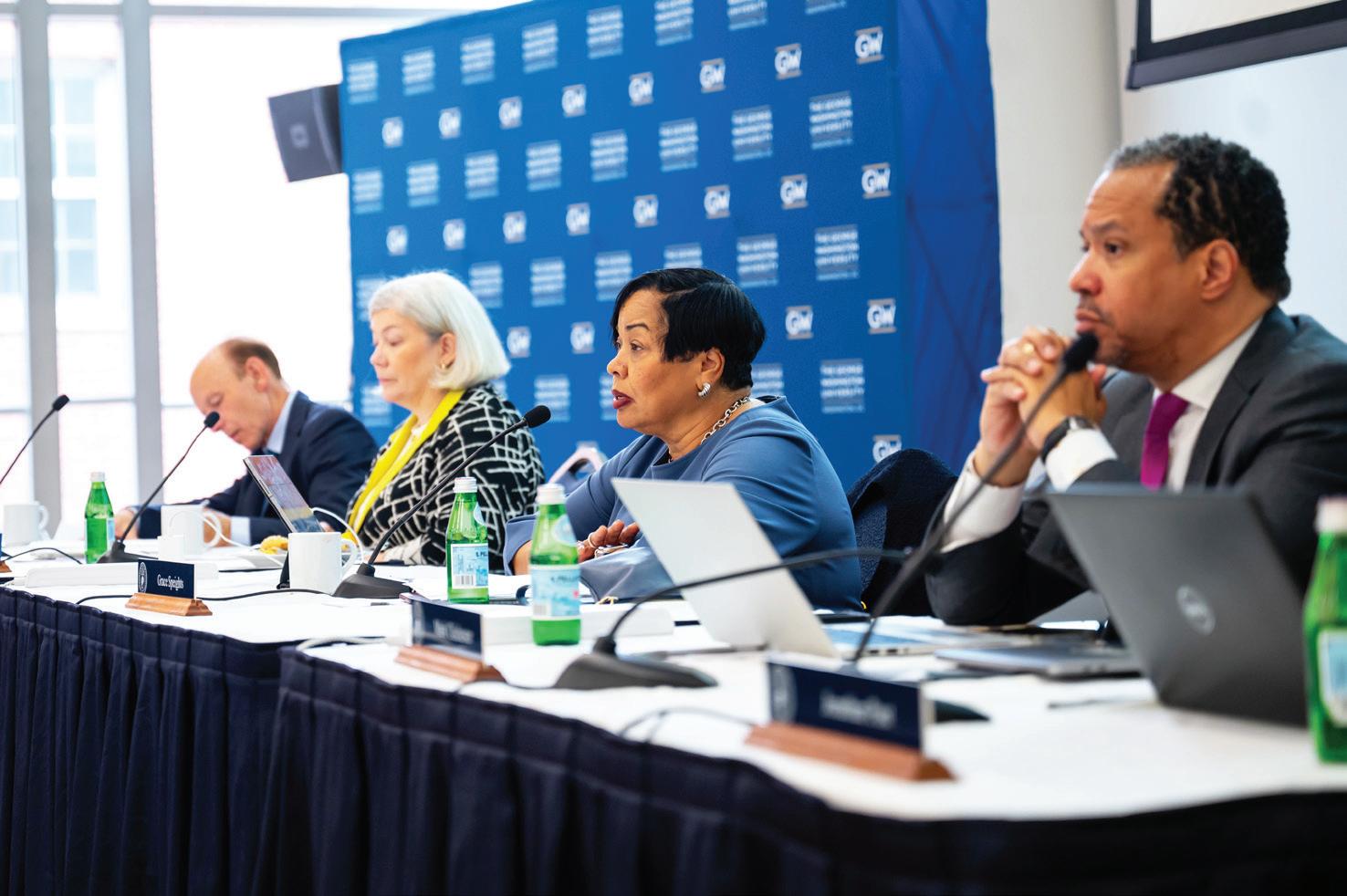
groups impacted by “recent events” in a University release. Granberg said officials will use the framework of the three-part community plan that launched in January to help GW emerge from tensions sparked by recent protests. The plan outlines educational programming for handling University life during times of conflict by fostering productive dialogue,
strengthening partnerships and increasing support for those affected by the war in Gaza.
“We’re also taking steps to engage GW’s incredible faculty around ways that we can use their elected expertise to inform and support humanitarian relief efforts in Gaza and in other parts of the world experiencing humanitarian crises,” Granberg said but didn’t
specify what steps. Granberg’s announcement comes after members of the Faculty Senate criticized the absence of faculty involvement in GW’s handling of the encampment last Friday, saying that professors’ relationships with students and expertise in their fields of study could have aided officials in their decisions.
Speights backs Granberg’s leadership after weeks of student protest
ARWEN CLEMANS | STAFF PHOTOGRAPHER Board of Trustees Chair Grace Speights addresses attendees at the Board’s May meeting.
JENNIFER IGBONOBA NEWS EDITOR TYLER IGLESIAS ASSISTANT NEWS EDITOR
DANIEL HEUER | ASSISTANT PHOTO EDITOR
University President Ellen Granberg speaks before the Class of 2024 on the National Mall at Commencement.
HANNAH MARR NEWS EDITOR
AN INDEPENDENT STUDENT NEWSPAPER • SERVING THE GW COMMUNITY SINCE 1904 • ONLINE AT GWHATCHET.COM May 20, 2024 HATCHET The GW Vol. 121 Iss. 2
HANNAH MARR NEWS EDITOR
ARWEN CLEMANS | STAFF PHOTOGRAPHER
See PSAKI Page 5 See STUDENTS Page 5 See SGA Page 5
Graduates exit Commencement holding a sign referring to the number of Palestinians who have been killed by Israel in Gaza.
Jewish students blend activism, religion during pro-Palestinian encampment
ANNA
FATTIZZO STAFF WRITER
Some Jewish students said they reckoned with their religious identity during the nearly two-week pro-Palestinian encampment on GW’s campus that police cleared earlier this month, reporting solidarity with the demonstration and a feeling of exclusion because of statements at the protest.
A collective of Students for Justice in Palestine chapters across the D.C. region created a tent encampment in University Yard and H Street late in late April to protest against Israel’s military assault in Gaza, demanding their local universities divest from companies from Israel and protect pro-Palestinian speech. The protest garnered support from members of the Jewish community, who joined rallies, as others held simultaneous demonstrations against antisemitism and acts of counterprotest.
Some Jewish student leaders said they were uncomfortable with signs at the protest that said “Students will leave when Israelis leave” and protest chants calling for an Intifada, which they said had antisemitic sentiments. Others said the encampment welcomed Jewish voices advocating for Palestinian liberation and created a peaceful, multicultural community through Shabbat, Orthodox Christian and Muslim prayer services during the demonstration. Many Jewish student leaders said the use of police force that ended the encampment created an unsafe environment for students involved.
Reese Tolchin, the incoming president of GW J Street U — a student organization promoting a two-state solution to the Israeli-Palestinian conflict — said she wanted to join the protests because she believes in the “movement” but that the encampment was not an “inclusive” space for Jewish students because of calls for an Intifada, which
she said has historical connotations with violence against the Jewish people. There are many interpretations for the word — which, in Arabic, means “shaking off” — but it historically refers to two Palestinian civil uprisings in the West Bank and Gaza Strip to fight against Israel’s occupation of the territories, which led to the deaths of more than 5,000 Palestinians and about 1,400 Israelis.
“If they were just chanting for a ceasefire, just for an end to occupation, for BDS, an end to violence, I would be there, but because these slogans are so complicated and can mean violence depending on the interpretation, I feel mixed feelings about showing up there,” Tolchin said.
Tolchin said the University should have negotiated with students before sweeping the encampment because the clearing of the encampment was “hostile” and will create more tension on campus. Officials met with members of the Student Coalition for Palestine at GWU last week and said the University is not considering changing its investment strategies, which protesters demanded to cut ties to Israel.
“Just because the encampment was cleared, doesn’t mean that energy and like the anger against the University is gonna go away,” Tolchin said. “I think it’ll only be heightened so I don’t think it’s accomplishing any goal of making people feel safe on campus.”
A representative from Jewish Voice for Peace, a group that advocates to end Israeli occupation in the West Bank, Gaza Strip and Jerusalem, said the protest included many Jewish students and focused on “collective humanity,” demonstrating Jewish values through standing against Israel’s war on Gaza and calling for Palestinian liberation. The JVP said the presence of Jewish demonstrators at the encampment shows the need for a “Judaism beyond Zionism” to help advocate for

Palestinians.
The JVP representative said campus discussions about the safety of Jewish students do not reflect the entire Jewish community. The representative said the MPD’s use of force and pepper spray during officers’ clearing created an “unsafe” environment at the encampment.
“As Jewish human beings, who were taught that they should not stand idly by their neighbor’s blood and that if a single life is ended, it is akin to ending a whole world, we participate in and are welcomed into this solidarity movement,” the representative said in an email.
A first-year Jewish student and a member of Chabad GW and GW Hillel, who requested anonymity due to safety concerns, said they were “relieved” that police cleared
Speakers urge MSSC graduates to protect, cherish center at ceremony
JENNIFER IGBONOBA NEWS EDITOR
Students gathered in Lisner Auditorium with their friends and families for the Multicultural Student Services Center’s Commencement celebration on Thursday, where speakers urged graduates to protect the center after they leave GW.
More than 80 graduates, ranging from undergraduates to masters and doctoral students, received MSSC embroidered stoles and members of the LGBTQ+ community received lavender cords. In their addresses to graduates at the ceremony Thursday morning, students and administrative staff acknowledged turbulence this year on campus and at the MSSC following staff departures and urged students to continue contributing to the center to preserve its resources for multicultural students.
“As the interim director of the Multicultural Student Services Center during a challenging academic year, I hope that one of those memories you hold at GW is that of the center,” said Mitchell Foster. Foster, who joined the MSSC staff in February, said they hope the MSSC has
provided graduates a “place of respite” during difficult times in their college career, and that students were able to build community among themselves and from staff members. .
Jordan Shelby West, the associate vice provost of the Office of Diversity, Equity and Community Engagement, acknowledged the importance of celebrating graduation weekend, but said there is also a “tremendous amount” of pain, heaviness, hurt, exhaustion and “potential distrust” that people may be feeling.
“Several of you experienced various forms of trauma and instances when you felt you needed to defend your humanity or the humanity of others that you care about because you felt you weren’t being seen, heard, or valued and for that, I’m sorry,” West said. “What job do I have, do we have if our students don’t feel they have a future?”
The ceremony follows a two-week long pro-Palestinian encampment protest that ended last Wednesday when local police cleared the encampment in the early hours of the morning, deploying pepper spray at protesters and arresting at least six GW students.
To conclude her speech, West shared the beginning lyrics of “Blackbird” by The Beatles, which uses a metaphor of a Blackbird with broken wings to symbolize the Black people fighting to end racial injustice during the Civil Rights Movement.
“Class of 2024, It’s your time to fly,” West said. “Sawubona, I see you. We will always be here for and with you. Home will forever be wherever we come together.”
Uwaila Stewart, who is receiving a master’s degree of public health and served as the graduate program assistant for the ODECE for the last two years, said the MSSC and its staff are the soul of GW.
“There is no other place on this campus more essential to student development, and there’s no other place on this campus that needs to be fiercely protected and defended,” Stewart said.
Stewart added that community and rest have become key themes in the MSSC.
“The emphasis we put on community is intentional," Stewart said. "The community is the bedrock of the growth that each of you have experienced in the past four years.”
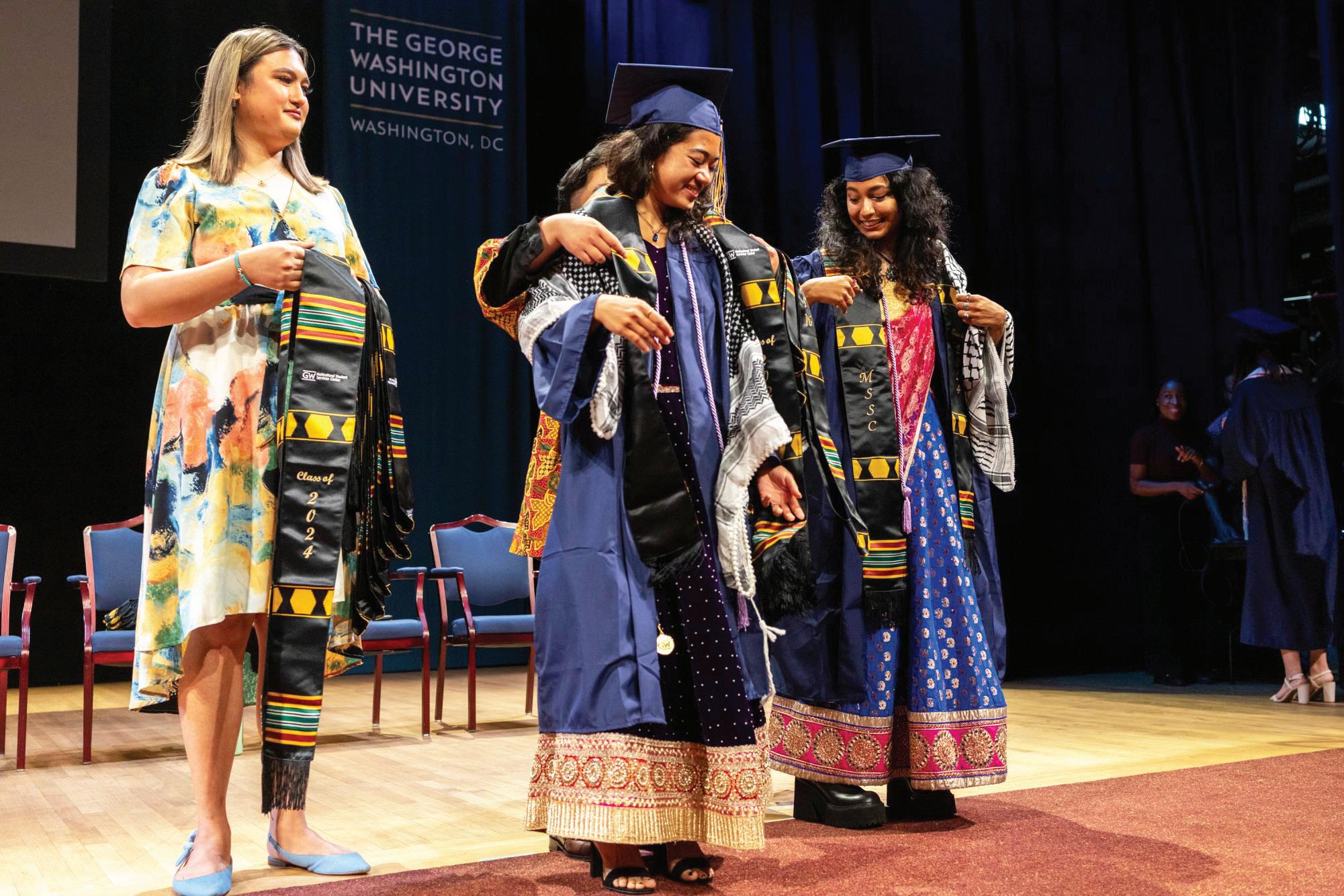
the encampment because they f felt targeted for wearing Jewish symbols like a Star of David on their backpack. The student said Jewish students on campus are facing “repercussions” for the actions of the Israeli government.
“I don’t represent Benjamin Netanyahu, I don’t represent the IDF,” the student said. “Why should I feel unsafe on my own campus because of the actions of a military on the other side of the planet?”
The student added that they wished local police handled the situation with less force.
“It could have been gone about in a much more peaceful, civil way,” the student said. “Instead of storming this encampment at 3:30 in the morning and pepper spraying people.”
A sophomore and a Jewish member of GW J Street U, who requested to remain anonymous due to fear of doxxing and retaliation, said they slept in the encampment for more than a week and were there when the Metropolitan Police Department cleared the encampment on May 8.
“Luckily no physical harm came to me but it was definitely a very, very scary experience,” the student said. “Images of that I have not been able to get out of my mind.”
The J Street U member said although certain chants and signs within the encampment made them feel uncomfortable, they joined the protests because they felt their discomfort was incomparable to Palestinian suffering in Gaza from famine, displacement and injury.
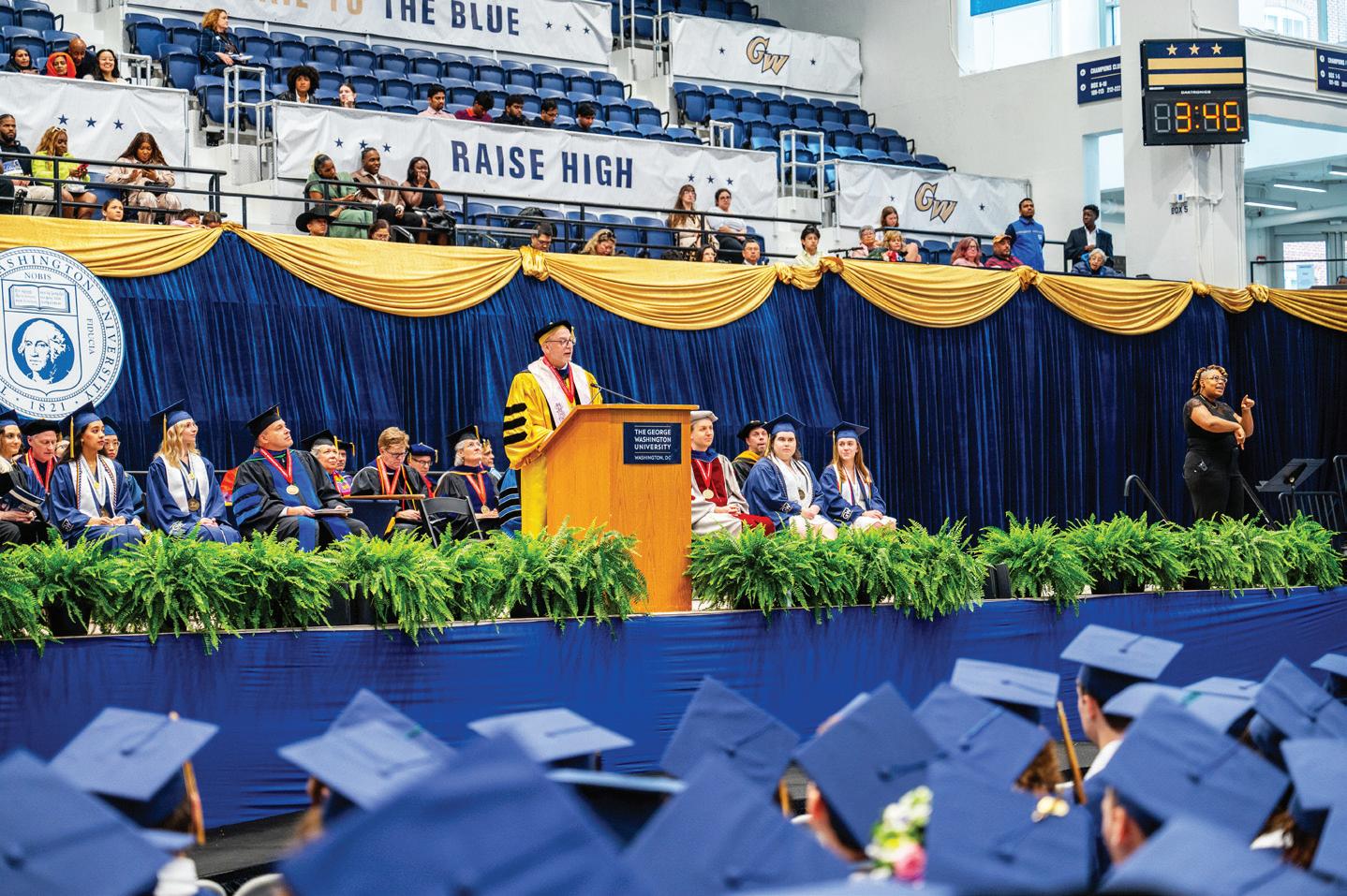
CCAS dean advises graduates to learn from each other, guide future
BROOKE FORGETTE
CONTRIBUTING NEWS EDITOR
TYLER IGLESIAS
ASSISTANT NEWS EDITOR
The Columbian College of Arts & Sciences hosted two Commencement ceremonies for its undergraduate students, who span across 67 majors, in the Smith Center on Saturday, as students in the crowd protested the University’s handling of recent pro-Palestinian demonstrations on campus.
Dozens of graduates in both ceremonies wore black and white keffiyehs over their gowns, while some waved Palestinian flags or signs reading “Divest” as they walked across the graduation stage without shaking Dean Paul Wahlbeck’s hand. During these demonstrations, the live video feed displayed on the Smith Center video board would switch to a different camera angle of the crowd rather than the protests on stage.
During his speeches at both ceremonies, Wahlbeck addressed the crowd and said the liberal arts education that graduates received during their time at GW
prepares them to make an impact on their community and continue learning throughout their lifetime. He said graduates should take the opportunity to learn from those around them, especially those who challenge their views.
“The issues of the day underscore the need for constructive discourse,” Wahlbeck said. “Now is the time to be the voices that bridge our differences and guide our future.”
Fallon Goodman, a professor of psychological and brain science and the faculty speaker at the first ceremony, shared advice from lessons she teaches in her Science of Wellbeing class. She said graduates should embrace uncertainty and employ courage in the face of failure to find happiness in their lives.
“You do things that are important to you, regardless of how uncomfortable they make you feel,” Goodman said. “Being courageous doesn’t have to involve acts of heroism or physical bravery, you can be courageous in the choices that you make every day.” Goodman said while each chapter of a graduate’s life might look different, the tools and skills they use to
navigate it will remain constant.
“And when you encounter your next challenge and think, ‘What now?’ It means that despite any constraints of your circumstances, despite any experiences of your past, you have an opportunity to make choices that serve the future ahead of you,” Goodman said. Photojournalism major Danielle Towers, one of the distinguished scholars from the Class of 2024 and a former assistant photo editor for The Hatchet, said in her speech to fellow graduates that faith, hope, gratitude and love have guided her and Generation Z through challenges like isolation during the pandemic.
“If we learn to adjust our sails, we can use the wind to navigate in any direction,” Towers said in her speech. Sonia Goyal, a biology major and a distinguished scholar, said in her speech that the Class of 2024’s undergraduate career was marked by highs and lows, but everyone emerged as a better version of themselves.
“During this time, we became ambassadors of integrity, leaders of innovation and champions of excellence,” Goyal said in her speech.
NEWS THE GW HATCHET May 20, 2024 • Page 2
KAIDEN J. YU | ASSISTANT PHOTO EDITOR
A protester wearing a kippah looks toward a Palestinian flag at a rally in November.
SAGE RUSSELL | SENIOR PHOTO EDITOR A graduate receives their stole at the Multicultural Student Services Center Commencement ceremony. THIS WEEK’S EVENTS AI FAIRNESS IN MEDICAL IMAGE ANALYSIS SEMINAR Wednesday, May 22 | Noon | Online Attend a seminar analysis hosted by the GW Biomedical Informatics Center. ASIAN AMERICAN AND PACIFIC ISLANDER HISTORY MONTH CELEBRATION Tuesday, May 21 | 12:25 p.m.| Science and Engineering Hall Watch a tapestry's illumination to celebrate the month. Intense heat and humidity at University Commencement on The Ellipse caused 37 graduates to seek first aid treatment and three graduates went to hospitals. THIS WEEK IN HISTORY May 20, 1996 NEWS
ARWEN CLEMANS | STAFF PHOTOGRAPHER
A speaker addresses the Columbian College of Arts & Sciences graduating class.
MPD fires gun at subject less than block from campus
JENNIFER
RYAN
A Metropolitan Police Department officer shot an individual Saturday afternoon at the Columbia Plaza Apartments, less than a block away from campus.
MPD Second District Commander Tatjana Savoy said at a press conference at about 5:30 p.m. that a person stabbed an MPD officer in the neck with a knife at the intersection of 24th Street and Virginia Avenue while officers attempted to take them into custody for an evaluation. Savoy said officers attempted to tase and then fired a gun at the individual.
Savoy said the subject received medical service on scene and was transported to a nearby hospital for non-life-threatening injuries. She said the subject was charged with assault on an officer and the officer who was stabbed received medical treatment on the scene.

Savoy said it is unclear where the officer shot the individual, adding that an investigation into the incident is still ongoing. She said MPD placed four officers involved in the incident on administrative leave but did not provide a reason.
“At this time, we have four metropolitan police officers that are currently on administrative leave pending an investigation and the individual has been charged with assault on a police officer,” Savoy said.
Savoy said MPD officers arrived on scene at 10:40 a.m. to respond to perform a welfare check after a friend called the department on a person who was in apparent mental distress. She said MPD dis-
patched the Department of Behavioral Health, who said upon arrival that the individual should be taken into custody for an evaluation.
Officials issued a GW Alert at about 2:30 p.m. asking community members to avoid the area due to “urgent police activity.”
A subsequent GW Alert at 3:20 p.m. said MPD had taken a suspect into custody and said there is no active threat to campus.
In the District, if a person is deemed mentally ill
Graduates celebrate end of year with inaugural Senior Week
Officials organized the first-annual week of programming dedicated to commemorating seniors and their achievements before the start of Commencement Week on Thursday.
The programming, a part of the Office of Student Life’s “Senior Week,” spanned six days with 14 events for the Class of 2024, including tabling events like a “First-Gen Family Thank You,” where families could grab graduation cards and first generation student pins and larger events like a cruise on The Wharf to celebrate seniors’ final days as undergraduates. Seniors said they appreciated classspecific events after a nontraditional start to their college careers in 2020, when they missed out on events like Orientation Week and in-person classes due to the COVID-19 pandemic.
Dean of Students Colette Coleman said the week was a commemoration of the community that seniors have built throughout the past four years and officials intend to continue the programming for future graduating classes.
“This week is especially important, as the class of 2024 did not get to experience a traditional high school graduation, due to the global COVID-19 pandemic in 2020,” Coleman said in an email.
Coleman said officials were excited to host events the Senior Laser Tag on Monday night in the Lerner Health and Wellness Center, the Wharf cruise with Whitlow’s on Water, a floating bar, and “Last Night” — which included a “Biergarten” with drinks for people older than 21 and free copies of this year’s Commencement speaker Jen Psaki’s new book “Say More: Lessons from Work, the White House, and the World” — where seniors and their families were invited to say their “final goodbye to GW.”
Some events were sparsely attended like the “Senior Send-Off with Dean Coleman” with about 15 students trickling in and out for the duration of the event. Others had about 100 students, like the Senior Trivia Night, Senior Night at ExPat and Last
Night on the first floor of the University Student Center. Orlando Martinez, an international affairs major, attended Last Night and said he’s gone to other major events throughout his time at GW including Program Board’s Spring Fling and Fall Comedy Show, and he was happy to see officials putting on a large event catered towards the senior class.
“It helps us reflect on what we’ve had the last few years and it does make you kind of feel special that you know, we’re seniors that we get to celebrate something outside of like midnight breakfast, and that’s a whole school event,” Martinez said.
Martinez said he’s heard that the COVID-19 pandemic “killed” student life and school spirit at GW and that he believes that officials are trying to return to pre-pandemic spirit.
“I do credit GW for trying to give us opportunities to have fun events at the bond one last time before we all had our different ways,” Martinez said.
Senior Iman Khan, a psychology and biological anthropology major, said the Class of 2024 didn’t get traditional “senior experiences” in high school or a proper orientation at GW due to COVID-19, adding that her time at GW has “gone by so fast” due to the Class of 2024’s lack of a full first year because of virtual classes. She said she wishes she had more time to spend at GW because college is a period to “experience your youth.”
Khan said she had flashbacks to her senior year earlier this month due to a similar uncertainty surrounding Commencement after the University of Southern California canceled their main ceremony for seniors due to “new safety measures” and proPalestinian demonstrations on their campus. GW officials said Commencement ceremonies and final exams would continue throughout the 13-day encampment earlier this month.
“We’re still getting a graduation,” Khan said. “I’m glad that they’re doing stuff like this to at least make us feel like we were included and like they were doing stuff for us.”
Gillian Mendoza, a senior and international affairs major, said she attended Senior Week events to take advantage of giveaway and to see friends “one last time.”
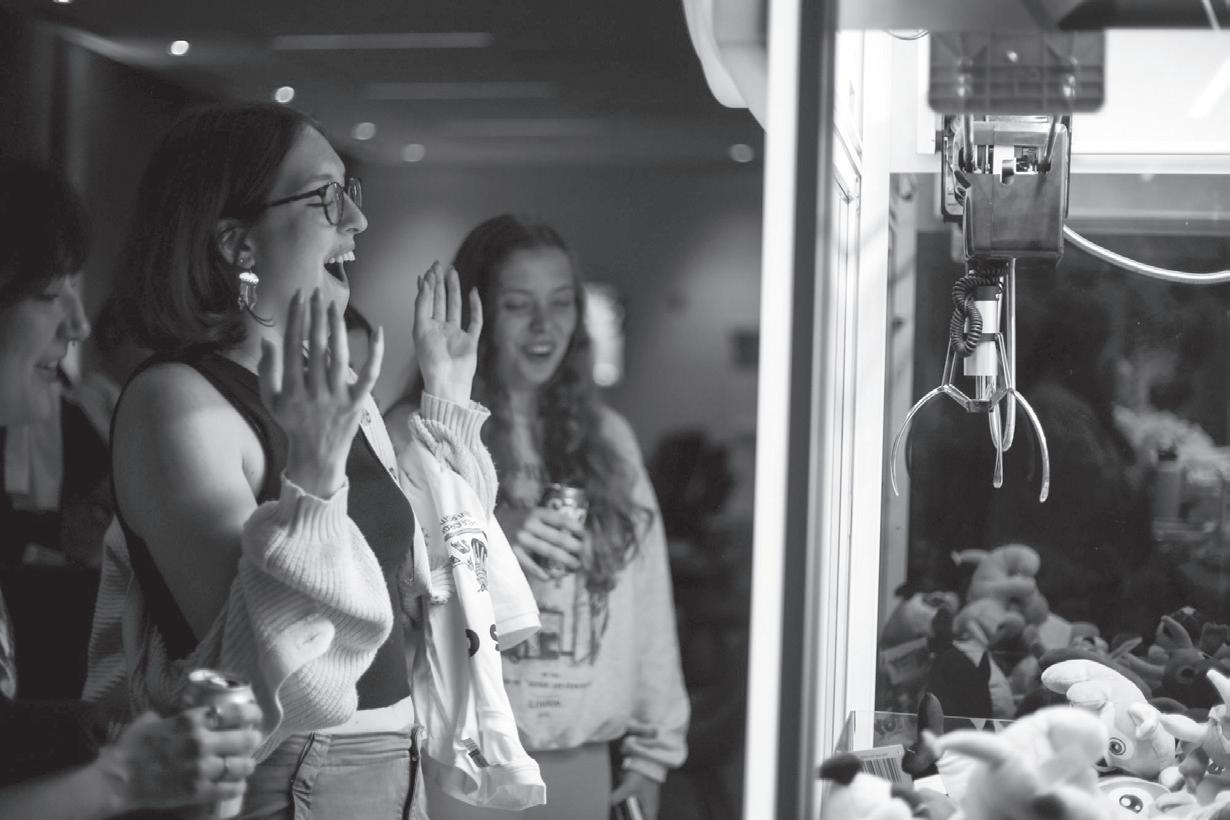
CRIME LOG
TRAFFIC ACCIDENT: HIT AND RUN
Public Property on Campus (2200 Block of I Street NW)
5/16/2024 – 2:36 a.m.
Closed Case
GW Police Department officers arrived at the scene to assist Metropolitan Police Department officers after a male student was struck by a car while walking across the street. The vehicle left the scene after striking the student. The student was then transported to the emergency room at GW Hospital. Referred to MPD.
HARASSING PHONE CALLS
Off Campus
Reported 5/16/2024 – Multiple dates and times
Closed Case
A female student reported being the victim of harassing phone calls from an unknown subject who claimed to be law enforcement. No suspects or witnesses
THEFT II/FROM BUILDING
and “likely” to harm themselves or others, they may be taken into custody and brought to a mental health facility for assessment, according to DBH policy.
The policy states that a law enforcement officer, a qualified physician or a DBH agent must make the decision to take a person into custody, who then must complete an application for emergency admission that states the circumstances in which the individual was taken into custody.
2121 F Street NW
Reported 5/15/2024 – Unknown date and time
Open Case
A female student reported her property — including luggage, a personal care item and an iPad — was stolen from an unsecured room in her suite. Case open.
CPS gains Faculty Senate representation after
years of consideration
TYLER IGLESIAS ASSISTANT NEWS EDITOR
The College of Professional Studies will have representation in the Faculty Senate for the first time next academic year, which faculty said will further shared governance.
John Warren, a professor and the director of publishing at CPS, and Scott White, an associate professor and director of cybersecurity, were elected as nonvoting delegates after the senate and the Faculty Assembly voted to grant the school representation last year. Warren and White said the new positions will help raise awareness of CPS’s role at the University as a peer to other schools and colleges, build partnerships between CPS and other GW programs and join other faculty in advocacy for shared governance — the role of faculty to consult the University on decision making.
In April 2023, faculty senators passed resolution 23-8 to instruct the Faculty Assembly, a meeting of University-wide faculty, to add two nonvoting delegates from CPS to the senate through the Faculty Organization Plan, the document that outlines the faculty’s role in decision making at the University. The resolution, introduced by Guillermo Orti, a faculty senator and the chair of the Professional Ethics and Academic Freedom Committee, states that senators recognize the “substantial” contribution CPS brings to the University and the senate shouldn’t bar CPS from having representation because it lacks tenured faculty.
“CPS is the only school without senate representation for no other reason than it has no tenure track and that is by design,” said Orti at the April 2023 meeting. “So what we’re doing right now is depriving one school entirely from being in the senate.”
Before faculty amended the FOP, the plan stated that faculty needed to have tenure to serve on the senate, with an exception for the School of Medicine and Health Sciences since many faculty from the schools do not have tenure. The delegates from CPS and the senators from SMHS must have three years of service to the University and hold the role of associate professors or higher to serve on the senate.
The new guidelines on CPS representation set up two nonvoting delegates for the school on the senate and a nonvoting seat on the Faculty Senate Executive Committee — where each school with senate representation has one seat — which Warren will serve on. The CPS senators and other CPS representatives on other Senate committees will still be able to vote.
The amendment to the Faculty Organization Plan states faculty will revisit the voting rights of CPS delegates three years after the first delegates are in the senate. Natalie Houghtby-Haddon,
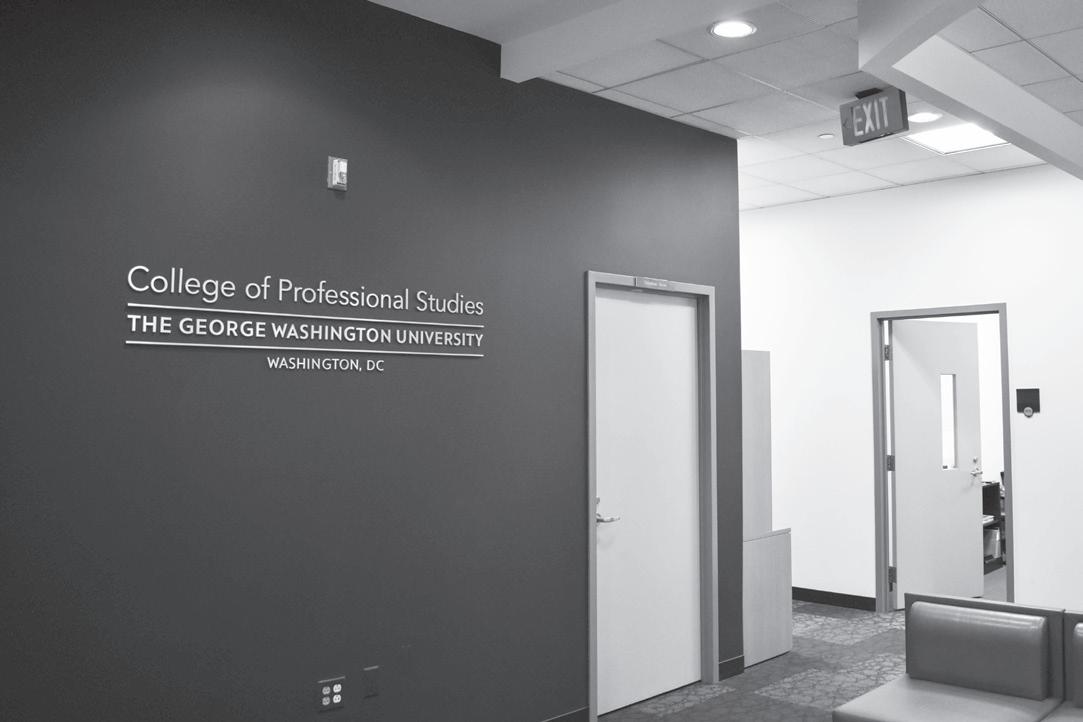
the associate director for the Center for Excellence in Public Leadership in CPS and co-chair of the senate’s Professional Ethics and Academic Freedom committee, said the idea of CPS representation in the Faculty Senate among senators and PEAF committee members emerged during the 2021-22 presidential search. She said discussions about representation began in the senate when the Faculty Consultative Committee, a group of faculty members representing GW schools with senate representation who advise the Board of Trustees during presidential searches, included representatives from CPS since it is an academic unit of GW despite their lack of senate representation.
“That was when all the dots began to connect with my colleagues on PEAF, from other schools and colleges to say, ‘Oh, yeah, that doesn’t make sense, how can we make it possible for CPS to have a seat at the table?’” Houghtby-Haddon said.
Houghtby-Haddon said when the PEAF committee introduced the resolution to add CPS representation to the senate, it called for CPS to have a voting member on the senate Executive Committee. She said when senators were voting on the resolution, they amended the Executive Committee seat to a nonvoting position due to concerns that the CPS representative would not speak out against administration out of fear of retribution from University, like losing their job, since their lack of tenure does not protect their jobs.
“The Faculty Senate was concerned about the lack of tenure and the ability, the freedom, the willingness to take stands potentially, that would contradict the administration and policy or whatever and that the CPS faculty would not be protected by tenure,” Houghtby-Haddon said.
She added that the Executive Committee also hears disputes over tenure decisions and those only tenured faculty can vote on those decisions, so the CPS member would have to abstain if they were given voting power on the committee. She said when the University created CPS in
2001, it decided faculty at the school would not have tenure to be flexible in hiring and create degree programs that respond to the “changing needs of the marketplace.”
Houghtby-Haddon said the three-year review of CPS’ voting power gives time for senators and trustees to review their position on whether CPS faculty should have tenure.
Warren said he enjoys building relationships that benefit his program and CPS as a whole.
“I think a lot of people at GW, even faculty, even some senior faculty, don’t really know it exists or don’t know what it does or how it’s different,” Warren said. “So part of it is just being involved and building relationships.”
Warren said he hopes CPS’ representation in the senate will bring more academic collaboration between CPS and other colleges and programs at GW. He said the variety of programs in CPS like the publishing program allows for more connections with different areas of the University like the English department and student journals.
Warren said it is a “good time” for CPS to have a voice at GW since CPS is under the new leadership of Dean Liesl Riddle and is developing a strategic plan at the same time the University is developing its own.
“There’s a lot of change going on, there’s a lot of new leadership at GW too, with a relatively new president, a relatively new provost,” Warren said.
White said he wanted to join the Senate because he believes shared governance is “very important” to a university’s academic environment.
“I think what makes our particular environment so strong is that we do have this common mission here at the University and we share governance toward that common mission,” White said. “I think that’s imperative, I think we must continue it in universities.”
White added that the new guidelines for CPS representation allows the school to have an equal voice in the senate as other schools and colleges at the University.
— Compiled by Ella Mitchell
NEWS THE GW HATCHET May 20, 2024 • Page 3
IGBONOBA NEWS EDITOR
J. KARLIN CONTRIBUTING NEWS EDITOR
DANIEL HEUER | ASSISTANT PHOTO EDITOR
Metropolitan Police Department Second District Commander Tatjana Savoy speaks at a press conference outside of the Columbia Plaza Apartments on Saturday.
JENNIFER IGBONOBA | STAFF PHOTOGRAPHER A graduating senior reacts after losing their prize in a claw machine during the Last Night celebration. JENNIFER IGBONOBA NEWS EDITOR BROOKE FORGETTE CONTRIBUTING NEWS EDITOR
HATCHET FILE PHOTO
The College of Professional Studies office, located on the third floor of the University Student Center.
Former SGA president, vice president look back on tenure
Former Student Government Association President Arielle Geismar and Vice President Demetrius Apostolis reflected on their successes and shortcomings from the 2023-24 term with a shared sense of pride and fatigue.
During their terms, Apostolis and Geismar carried out initiatives like the first GW Half Way to Pride Day — a day reserved for celebrating the LGBTQ+ community at GW — and the name change of the Student Government Association, formerly known as the Student Association. Apostolis and Geismar said along with their wins, they failed to obtain U-Pass cards for part-time graduate students and struggled to further advocate for Jewish and Israeli students and Arab, Muslim and Palestinian students because of a lack of interest in joining the councils the SGA created in December.
In February, senators voted to rename the Student Association to the Student Government Association after students told Geismar that the acronym SA was “harmful to be interacting with” as it has become an abbreviation when referring to sexual assault. She said she is “pleased” at how quickly students have incorporated the new acronym into their vocabulary but said she had to attend multiple meetings with the Board of Trustees to convince them that the old language was upsetting to some community members.
“That process was a lot of meetings and convincing some folks in power that this was actually a change that was needed,” Geismar said. “I think it was tough to kind of have to consistently reiterate something that a lot of students already knew to administration, but
we were able to do so.”
Geismar said she also worked to support underrepresented students on campus by advocating for affinity housing for the LGBTQ+ community and hiring a gynecologist in the SHC.
Apostolis, who ran on a platform of increasing dining options and communication between members of the SGA, said he is most proud of the nine months of work he dedicated to the secondannual Career Expo — which provided opportunities for undergraduate students to speak with employers. He said he created the expo after students expressed a lack of knowledge about their possible career options.
Apostolis said he maintained an “open door policy” throughout his vice presidential term in an effort to be a resource to senators throughout his term.
“While I found this challenging, I think that we honestly did a really good job of making sure that everyone felt comfortable this year,” Apostolis said.
Apostolis said he was unable to obtain U-Pass cards for part-time graduate students by the end of his tenure, a goal he included in his initial campaign platform, because the Metro was unwilling to make changes to their program with GW due to “financial restraints.”
Apostolis said the biggest challenge he faced as vice president was ensuring every opinion within the SGA was heard while overseeing a staff of about 40 students.
Geismar, Apostolis and current SGA President Ethan Fitzgerald created councils in December to provide both Jewish and Muslim students with support after heightened demonstrations on campus and free speech concerns following the outbreak of the war in Gaza. She said as soon as things

started “heating up” on campus, she felt as though she couldn’t ignore the topic and needed to “try at a minimum” to advocate for students as protests continued.
“Especially after the events of October 7, we received a lot of requests for SGA to support students on campus,” Geismar said. “We saw a lot of students engage in advocacy and activism and my instinct was to aid and support that.”
The executive order for the councils, sponsored by Geismar and Fitzgerald, stated that the two councils would consist of 10 to 18 students each and would establish cultural programming for Jewish and Israeli students as well
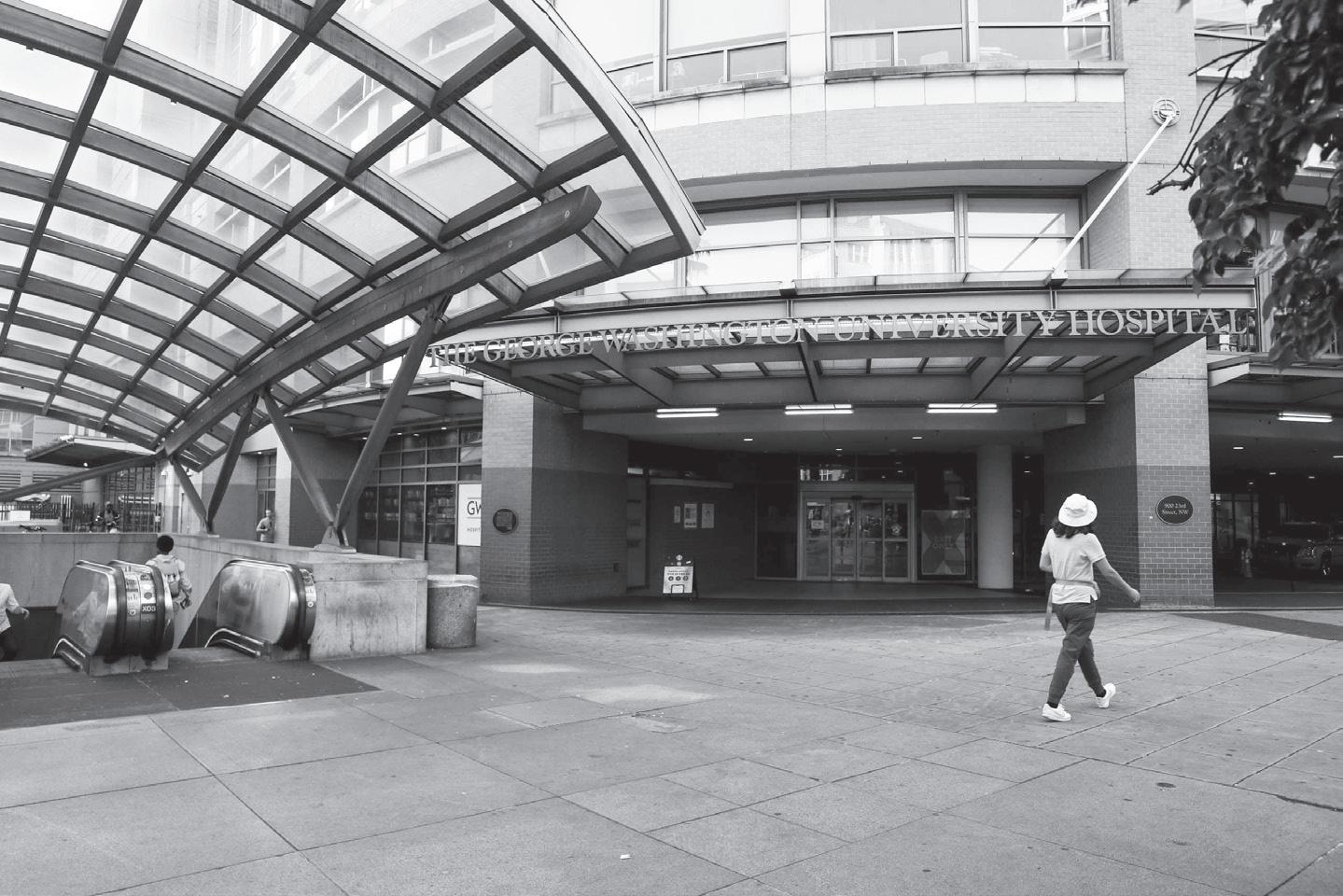
Labor board says GW Hospital bargained with union in bad faith
The National Labor Relations Board ruled GW Hospital’s contract negotiations with a union unlawful last week, 10 months after vacating a previous decision that claimed the hospital abided by federal labor laws.
The new ruling states that the hospital violated the National Labor Relations Act — a 1935 piece of legislation that authorizes employees to participate in unions to advocate for better working conditions and wages — after it “failed” and “refused” to bargain with the 1199 Service Employees International Union in “good faith” from 2016 to 2018 and then ceased recognition of the union in October 2018. The ruling orders GW Hospital to recognize and bargain with the union in good faith, rescind changes the hospital made to employment terms and conditions unilaterally after October 2018 and compensate employees for any lost benefits, earnings and all adverse tax consequences and expenses.
“This is an incredible win for GW Hospital workers, who were without union representation for years,” said Lisa Brown, the executive vice president of 1199 SEIU in Maryland and D.C. in an email statement. 1199SEIU covers the cleaning, food service and ambulatory workers at the hospital. GW Hospital nurses voted for union representation from the D.C. Nurses Association last July to address staffing and training concerns with hospital officials. A GW Hospital spokes-
person did not immediately return a request for comment.
The NLRB’s ruling states that over the course of 14 months, from March 2017 to June 2018, the hospital pushed three bargaining proposals in bad faith — a no-strike provision that eliminated arbitration and a management rights clause that gave the hospital unilateral control over “virtually all significant terms and conditions of employment.”
The parties’ five-year collective bargaining agreement contract was set to expire in December 2016, which prompted the parties to hold more than 30 bargaining sessions between November 2016 and October 2018 where they were unable to reach a complete agreement.
The recent ruling states that the NLRB agreed with the judge on the case that “pressing a combination” of the bargaining proposals while negotiating with the union constituted bad-faith bargaining on the hospital’s part.
“The Respondent’s proposals, taken as a whole, would have left employees and the Union with substantially fewer rights and less protection than provided by law without a contract,” the ruling states.
The NLRB vacated a previous decision in July 2023 which initially deemed the hospital’s bargaining with the union lawful and scheduled a rehearing after they found William Emanuel
favor of the 2021 ruling — had an undisclosed $50,000 stake in a mutual fund that invested in Universal Health Servic-
es, the parent company of GW Hospital. The NLRB’s Inspector General found Emanuel’s failure to disclose his shares in UHS violated federal codes and posed a potential conflict of interest.
Workers in 1199SEIU had represented more than 150 GW Hospital employees for more than two decades before the hospital received a decertification petition on Oct. 25, 2018 — which 81 of the 156 employees in the bargaining unit signed — and notified the union that it was immediately withdrawing recognition of the 1199SEIU with claims that the union had lost support of a majority of employees in the bargaining unit. Hospital officials then canceled all future bargaining sessions and implemented a new compensation structure and employee wage rates.
In response, union workers filed a complaint with the NLRB in October 2018 alleging the hospital bargained with the union in bad faith by opening negotiations with a “wish list, throw-in-the-kitchen-sink” proposal, and claimed the hospital could not legally withdraw their recognition of the union due to their alleged “bad-faith bargaining.”
An administrative law judge ruled in favor of the union in September 2019 before the NLRB overturned the ruling in May 2021, determining the hospital was engaging in “hard bargaining” but didn’t violate labor law because the union had allegedly insisted on maintaining the terms in the expired agreement instead of negotiating with the hospital to form a new one.
as Muslim, Arab and Palestinian students, conduct surveys on “student life, opinions and desires” and meet with University officials to share students’ perspectives. Geismar said inaction from the committees stemmed from a lack of participation from SGA members despite their “originally conveyed” interest when the SGA voted to create them in December. She said the councils are currently functioning as an “informal” group until they appoint the needed number of two commissioners per council. Geismar said the councils have yet to organize a meeting with officials like University President
Granberg, a goal that was included in the initial plan for the advocacy councils.
Apostolis, who co-sponsored the order, said the SGA released information about the councils to the student body to increase awareness and hopes the councils have success implementing initiatives in the future.
“It has been a little bit of a struggle and I’m gonna be transparent about that,” Apostolis said. “But I think we’ve been advertising it in every single one of our newsletters, we’ve advertised on Instagram, we’ve done everything we can to make sure that hopefully these became a success.”
Foggy Bottom apartment landlords named in ongoing antitrust lawsuit
FIONA BORK SENIOR STAFF WRITER
RORY QUEALY NEWS EDITOR
Amid an ongoing lawsuit into a group of D.C. landlords who have allegedly colluded to raise rent prices, students said they struggled to find affordable off-campus housing close to GW.
Fourteen of D.C.’s biggest landlords, including five that own buildings near campus, are named in an ongoing lawsuit, with D.C. Attorney General Brian Schwalb alleging the landlords unlawfully colluded with property management software company RealPage to raise rent prices by up to 7 percent in the District. As the lawsuit and federal investigation continue, students living in apartment buildings like the 2400 M Street apartments and The Statesman affected by the lawsuit and investigation said they’ve noticed raises to their rents in the last year, while students looking for off-campus housing said higher rent prices and additional fees have made the search for an affordable place near GW strenuous.
Schwalb’s legal complaint, which he launched in November following a ProPublica investigation into RealPage in 2022, alleges the group of landlords engaged in a price-fixing scheme, using RealPage’s algorithms to set higher rent prices through a single entity instead of competing against each other. The legal complaint says the alleged collusion increased prices
by 2 to 7 percent and is a violation of D.C. antitrust laws.
“Increases of this magnitude translate to millions in wrongfully inflated rents in the last four years alone,” the legal complaint states.
The D.C. Superior Court arranged an initial scheduling conference — the first formal hearing with the assigned judge that presents the parties with an opportunity to try and settle their case — on May 31 for the lawsuit, according to court documents.
The Department of Justice initiated a criminal investigation in March into RealPage and dozens of property managers and apartment owners across the country to determine whether RealPage’s software is facilitating a pricefixing scheme among property owners and managers.
The 14 landlords own more than 58,000 apartment units in the District, including more than 40,000 units priced using RealPage’s software. The legal complaint does not outline a timeline of when landlords used the software.
Five of the 14 defendant landlords — AvalonBay Communities Inc., JBG Associates LLC, Gables Residential Services Inc., Bozzuto Management Company and Equity Residential Management LLC — own seven buildings near the Foggy Bottom campus. The buildings include WestEnd25 at 1255 25th Street, the Westlight at 1110 23rd Street, Westbrooke Place at 2201 N Street, the 2400 M Street Apartments, The Flats at Dupont at 2000 N
Street, The Wray at 515 22nd Street and The Statesman at 2020 F Street.
Renee Tapp, an assistant professor of urban and regional planning at the University of Florida, said RealPage is one of the “dominant” property management softwares in the United States and that it makes suggestions for the rent prices of more than 50,000 apartment units in the District to landlords. Tapp said students living in larger multifamily apartment buildings, which are the main targets of the lawsuit, likely face higher rent prices, increased rates of eviction and “excessive fees.” She said students and lower-income individuals are disproportionately targeted by bigger landlords who charge nonrefundable fees for additional expenses like utilities that increase the cost of living for students without raising the actual rent price.
“It’s higher prices and worse living conditions,” Tapp said. “I would say that those are kind of the two things that I would see as kind of being likely spillovers from this lawsuit or likely things that students would encounter.”
Sidra Hussain, a 2024 graduate who lives in The Statesman and has lived in off-campus housing since 2020, said she was not surprised to hear about the lawsuit because she noticed a “massive increase” in rent prices when looking for a new lease last year. She said the apartment rent prices last summer were listed for hundreds more than they were in previous summers.
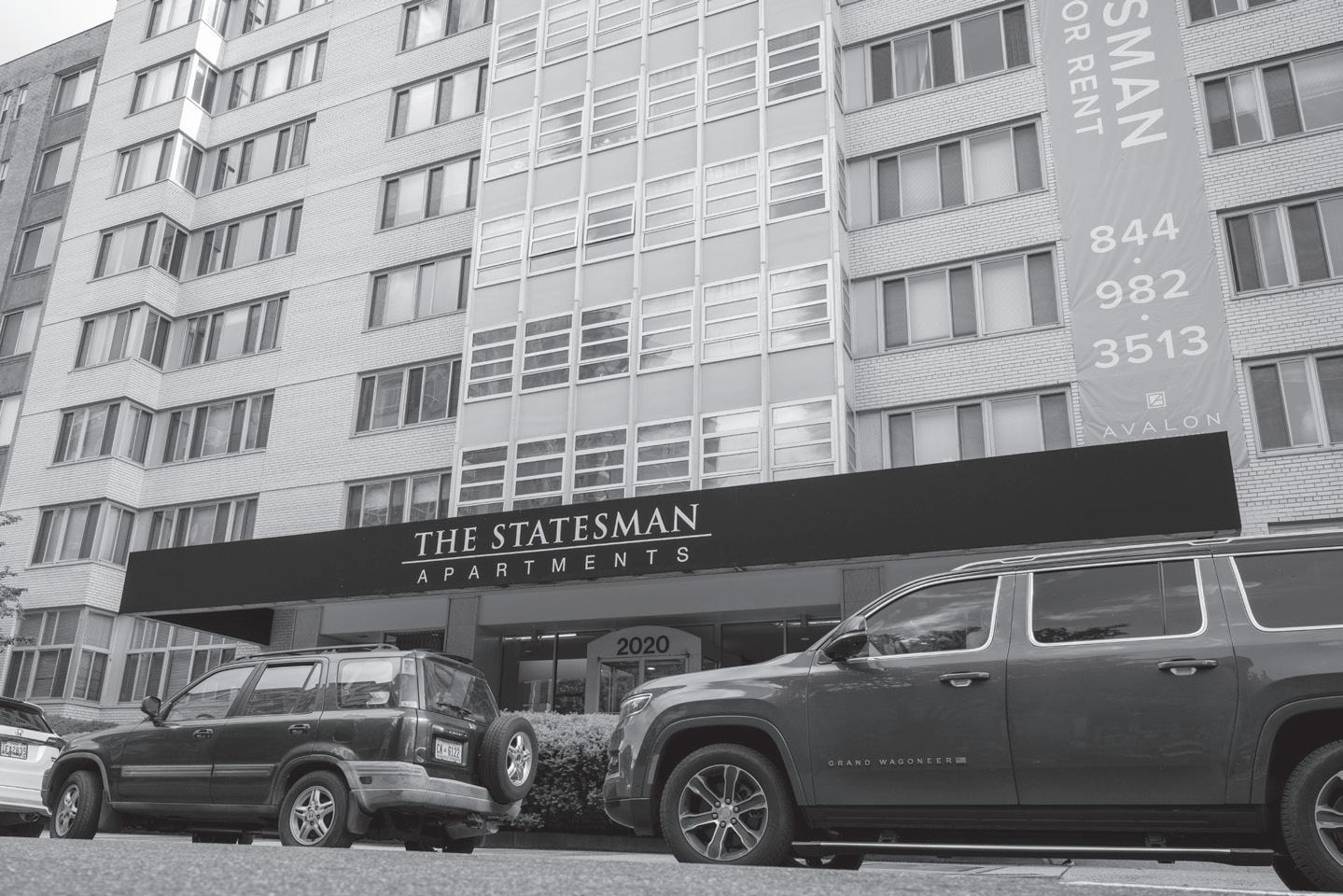
a former
who voted in
—
board member
NEWS THE GW HATCHET May 20, 2024 • Page 4
Ellen
MOLLY ST. CLAIR ASSISTANT NEWS EDITOR
RAPHAEL KELLNER | STAFF PHOTOGRAPHER
Arielle Geismar and Demetrius Apostolis, the former Student Government Association president and vice president.
FIONA BORK SENIOR STAFF WRITER FILE PHOTO BY SAGE RUSSELL | SENIOR PHOTO EDITOR A pedestrian walks by GW Hospital.
The
Apartments
F
DANIEL HEUER | ASSISTANT PHOTO EDITOR
Statesman
on
Street.
ANC commissioners condemn use of police force at GW protests
MPD and GW officials not to clear the demonstration on X, formerly known as Twitter.
Two members of a local governing body criticized GW and the Metropolitan Police Department’s handling the pro-Palestinian encampment at a Wednesday meeting.
Commissioners in the Foggy Bottom and West End Advisory Neighborhood Commission said the well-being of their constituents is a priority and that the actions of D.C. and GW officials to clear protesters did not reflect a commitment to community safety. Metropolitan Police Department officers swept the encampment in University Yard at about 4 a.m. earlier this month, deploying pepper spray and arresting 33 demonstrators.
ANC Chair Trupti Patel said commissioners hired and will announce in June a new executive director to replace Peter Sacco, who left the role in February.
Community members also voiced concerns about dangerous traffic at Washington Circle.
Here are some of the meeting’s highlights:
Two ANC commissioners comment on campus protests
Commissioners Yannik Omictin and Dasia Bandy — who are also GW alumni — condemned GW and city officials’ response to the almost two-weeklong pro-Palestinian encampment in U-Yard.
Omictin said he is “disappointed” in GW for calling on MPD to use force, like pepper spray, against its, and ANC’s, constituents.
“It’s shocking to have constituents ask, ‘What can we do about this? Can the ANC do anything about this? Can the city do anything about this?’” Omictin said. “‘No, the city was the one who sicced the cops on them in the first place. No one is out there trying to protect them from all this.”
On the second day of the encampment, Omictin posted his support for protesters and urged
Bandy said she has seen how the protests and GW’s handling of the encampment have impacted community members and does not support the use of violence and force to end demonstrations.
“I’m in solidarity with all those impacted by the conflict,” Bandy said. “I don’t condone any violence.”
Four community members warn of Washington Circle’s dangerous traffic patterns
Community members voiced concerns about Washington Circle’s traffic patterns, citing dangerous run-ins with vehicles.
Community member Cameron Mays testified that Washington Circle’s traffic pattern is hazardous for pedestrians. He said he lives just off of Washington Circle and routinely sees drivers running red lights and illegally turning right on red, especially on the northbound block of New Hampshire Avenue.
“I do believe that traffic calming modifications to the circle should be built to reduce traffic accidents and ensure the safety of those in the community,” Mays said.
Florence Harmon, a former ANC chair, said she has noticed dangerous traffic in Washington Circle since the 1980s and that cars often ignore crosswalks.
“The problem goes back decades,” Harmon said.
Omictin rebukes officials’ decision to move forward with Foggy Bottom encampment clearings
Omictin said he was frustrated that District and National Park Service officials authorized seven homeless encampment sweeps in Foggy Bottom on Thursday, evicting about 70 residents.
Omictin said in the meeting Wednesday that officials should have halted the evictions because The Aston, a former GW dorm that the District bought in July to convert into a homeless shelter, is not yet open. The Aston was origi-
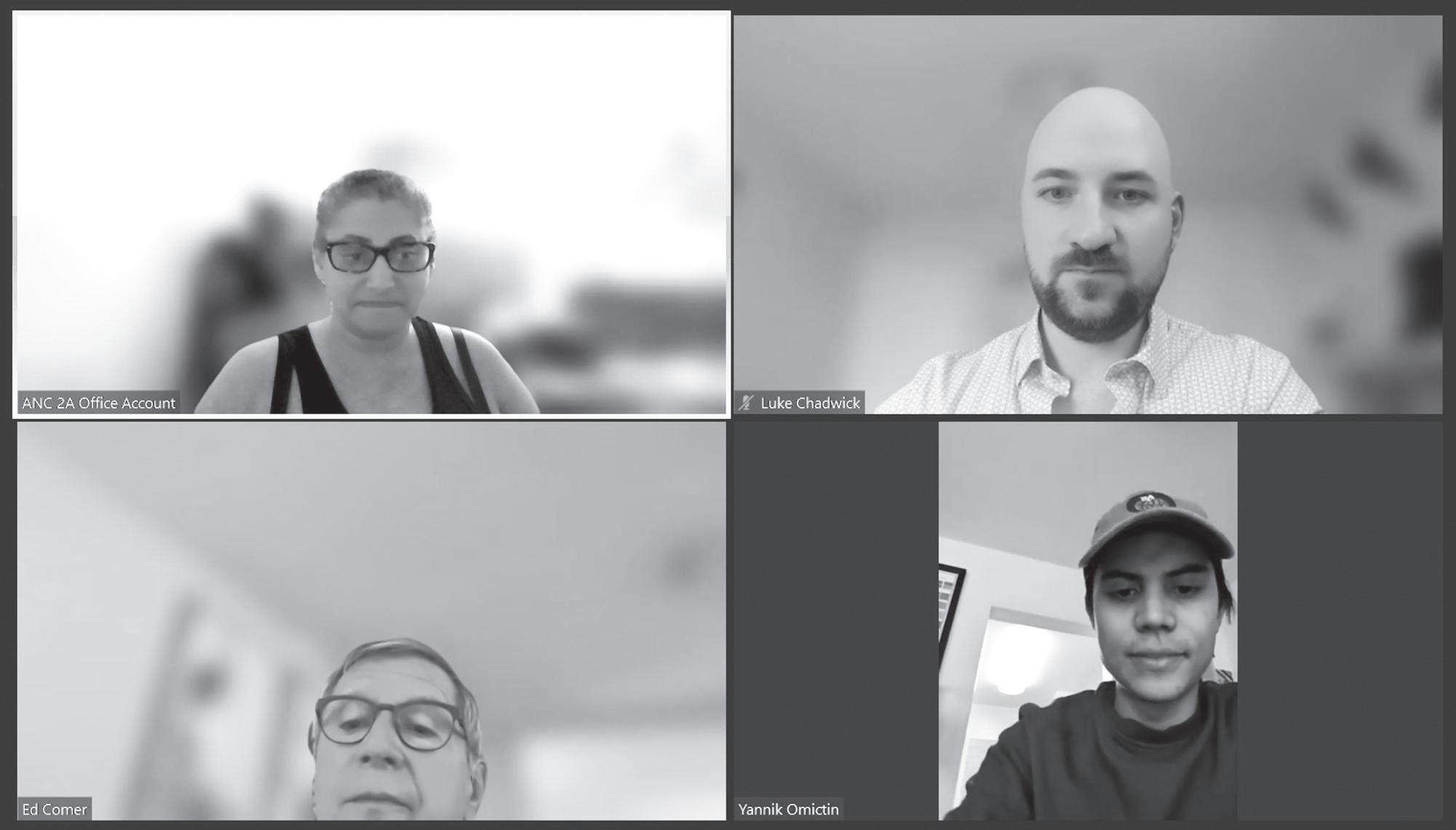
nally slated to open in November but is projected to open in August after significant delays due to lawsuits and issues securing a provider.
“People living in those encampments could have moved into The Aston but now probably won’t get the opportunity to do so because they are being cleared out by the Deputy Mayor’s office,” Omictin said. “Many will be lost to the system. Many are already moving to different places.”
Bylaws committee chair recaps first meeting
Florence Harmon, the chair of the ANC 2A Bylaws Revision Committee and a former ANC chair, said at the first meeting May 1 committee members discussed topics they would like to see included in the ANC’s bylaws and strategies for future meetings.
Commissioners created the committee at their January meeting to ensure the ANC’s bylaws are up to date with the D.C. Code. Harmon said the committee will address specific points they want to see included in the bylaws at the next meeting, slated for June 3.
ANC supports a university’s extensions to canopy, outdoor seating area
Commissioners unanimously approved construction plans to extend Bay Atlantic University’s canopy and seating area outside the university’s building at 1510 H St. NW.
Kaya Biron, an architect with the construction company We Design Build, said the canopy and outdoor seating area will be situated by a coffee shop the school is building, taking the place of the White House Deli. He said the canopy will be built above the additional outdoor seating area.
Biron said the outdoor seating area will have tables surrounded by a railing and will take up about 4.25 feet of the 17-foot-wide sidewalk, leaving about 13 feet of pedestrian walking space.
Commissioners send three resolutions to D.C. Council Commissioners unanimously approved 2A05 Commissioner and Vice Chair Luke Chadwick’s resolution asking the D.C. Council to request that the Construc-
Jen Psaki, Vincent Gray accept honorary degrees at Commencement
From Page 1
Psaki, the host of MSNBC’s “Inside with Jen Psaki,” said in her address that the Class of 2024 faced adversity when they had to adapt to learning during the COVID-19 pandemic, which gave them better understanding of the world compared to previous graduating classes.
“To finish college at this moment in history like this one, when it can seem as if the world is falling apart around you, in multiple ways, takes not only resilience but also optimism that there is a future for you,” Psaki said. “And I promise you there is one.”
Psaki said making mistakes offers a chance to regroup and “recalibrate” to avoid missteps in the future. She shared a story from her time serving as former President Barack Obama’s traveling press secretary on his 2008 presidential campaign when she split her pants at a track
and field campaign stop after she attempted to jump a hurdle.
“If you think something you do in the next 10 years or 15 years is so embarrassing, that it will ruin your career, I want you to remember that I split my pants in front of the future leader of the free world and he called it ‘X-rated,’” Psaki said.
Gray accepted his honorary doctorate of public service degree at the ceremony, marking his achievement in his advocacy for D.C. and his legacy at GW. Gray graduated from GW in 1964 with a bachelor’s degree in psychology and was the first Black student to enter the University fraternity system after pledging to Tau Epsilon Phi.
Dawn Kum, Gray’s wife, spoke on his behalf due to his recovery from a recent stroke, and said one of Gray’s biggest regrets was not pursuing a doctoral degree. She said he had planned on enrolling in a doctoral program at GW
before the COVID-19 pandemic.
“We take a few steps forward, around an unforeseen turn, maybe take a step backwards, but always keep our eyes on the prize and move forward,” Kum said. “That got you here today and that has brought Vince here today.”
Ledecky, an entrepreneur and co-owner of the National Hockey League team New York Islanders, said “hockey is life” and urged graduates to cherish their passion just as hockey players embrace their sport.
“Be sure to give your own grit, determination, tenacity and dedication to something you’re passionate about in your work and in your community,” Ledecky said. “You will continue to be winners by positively impacting the lives of others around you to make a true difference.”
In Granberg’s concluding remarks, which received fewer boos from students, she said graduates have gone beyond
checking the boxes necessary for graduation and have matured intellectually and emotionally as they explored their passions on campus.
“Through your scholarship, you have unlocked new knowledge and ideas and have emboldened your colleagues and teachers with your talent and your intellect,” Granberg said. “Outside of the classroom, you’ve succeeded in athletics, inspired us through the arts and given back to your communities.”
She called on the Class of 2024 to broaden their understanding of diverse perspectives and viewpoints they will encounter after college during her charge to graduates at the end of the ceremony.
“You came to GW to learn to change the world and I have no doubt that each of you will,” Granberg said. “I charge you to develop even greater empathy and understanding in your personal and professional interactions.”
tion Code Coordinating Board reevaluate indoor heating and cooling timeframes set for rental properties.
D.C. Housing Code Standards require buildings to supply heat between Oct. 15 and May 1. Chadwick said the goal of the resolution is to encourage the Council and the CCCB to consider changing heating and cooling regulations to be temperature-directed, instead of date-based. He said the change would allow property owners to turn on air conditioning early or extend heating based on the outdoor temperatures and pointed to an April 2023 petition calling for the switch, which garnered close to 1,600 signatures.
The ANC unanimously approved a resolution urging the Council to fund more than a dozen budget priorities in the D.C. fiscal year 2025 budget like the Foggy Bottom-West End Main Streets Program, Rapid Rehousing for Individuals and filling a $235,000 budget gap for the School Without Walls High School. Commissioners also unanimously approved a resolution requesting the Council fund roof repairs in FY 2025 for The Aston as officials convert it into a homeless shelter.
Students boycott graduation for Gaza
From Page 1
“You guys will make the change, you guys are the ones that give my cousins in Gaza hope,” the speaker said. “You are the ones that give them hope that their mother and their father’s legacy will continue to live.”
Metropolitan Police Department officers surveilled the area but did not engage with the demonstrators. A passerby flipped off protesters, and others took photos in front of the protest to mock demonstrators.
Graduates who stayed at the ceremony and their families didn’t engage with demonstrators as they entered and exited the mall, except for a few parents who told protesters it was not the time or the place to protest because they wanted to be able to see their child graduate
without disruption.
“Some of the parents in there want to say this isn’t the time or the place for a protest, and you know what I say to that?” a demonstrator asked the crowd. “F*ck your graduation.”
A representative from the Student Coalition for Palestine at GWU said it is morally imperative to take a “firm stance” against the “complicity” of universities in Israel’s bombardment of Gaza. They said there will be no graduations in Gaza this year because the Israeli military has destroyed or damaged 12 of Gaza’s higher education institutions and countless Palestinian students will never get the chance to walk across the stage.
“There can be no graduation as usual here while George Washington University deprives Gaza of theirs,” the representative said.
Outgoing SGA president says GW failed students during U-Yard protests
From Page 1
Arielle Geismar and Ethan Fitzgerald, the former and current Student Government Association presidents, respectively, urged the Board to add voting students to the governing body so trustees can understand students’ biggest issues. Geismar and Fitzgerald also said they supported increased University financial transparency.
Geismar said administrators knowingly endangered students when they allowed MPD to clear the encampment, given the police violence that has occurred at other universities when the police swept protests. Geismar stood up while saying that she “begged” for conversations with administrators throughout the two weeks of the encampment.
“I was taking meetings with students who were crying, I was coordinating academic support
with peers and mental health services,” Geismar said. “Where was GW? As an institution, we have failed our students.”
Fitzgerald, who joined the meeting virtually, said he is advocating for the University to create a working group of students from “diverse perspectives” to ensure GW is safe harbor for free speech and dialogue during his 2024-25 term but also one where students understand restrictions on these rights.
Fitzgerald asked trustees to address GW’s underfunding of the Multicultural Student Services Center, which students say has left the center unable to support cultural student organizations. He also encouraged the Board to reevaluate the University’s tuition by reassessing its former fixed tuition policy that guaranteed students a single fixed tuition rate for up to 10 consecutive semesters.
“As people are trying to navigate choosing colleges, as
they’re trying to navigate the journey of affordability here at GW, this would be integral to making that possible for students,” Fitzgerald said.
Speights did not address specific concerns brought forward by Geismar and Fitzgerald and instead thanked them for their comments.
Staff Council President Bridget Schwartz said she has heard from staff that they did not feel safe and were met with “discrimination” throughout the encampment. She criticized the lack of communication from administrators, adding that staff found out information about the encampment from social media and The Hatchet’s reporting instead of through the University.
“This lack of transparency added to the feeling of being unsafe,” Schwartz said.
Faculty Senate Executive
Committee Chair Ilana Feldman said in her report that the senate has not received a large amount
of responses in the portal that it created for faculty to report concerns about their ability to exercise their academic freedom, which shows that most faculty feel positively about the overall state of academic freedom at GW. Feldman said the reports that have been filed have been “overwhelmingly” connected to concerns about speaking on matters related to the war in Gaza.
Feldman also restated faculty members’ call for involvement in the University’s decision making on major issues facing the community, like the handling of the encampment.
“This is something that I think we need to pay attention to make sure that everybody, students and faculty, feels free to discuss a broad range of issues,” Feldman said.
Secretary Avram Tucker said that the University’s endowment, a financial foundation composed of real estate,
investments and donations, is continuing to rise to $2.8 billion from $2.6 billion in February. He said the endowment is currently the highest it has ever been in GW history.
Alumni Association President Maxwell Gocala-Nguyen announced that the University renewed his term as president for a second year, despite being originally elected to a one-year term. He also said the association is approaching its $12.9 million attainment goal and recently surpassed $11 million, with the rest of May and June ahead before the end of FY 2024 to reach the goal. He added that he is unsure if or how campus protests will affect their fundraising, but the association will adapt accordingly. He also said the association surpassed their annual April Giving Day goal, setting a new record with almost 3,500 donors and raising close to $1.9 million.
NEWS THE GW HATCHET May 20, 2024 • Page 5
ELLA MITCHELL CONTRIBUTING NEWS EDITOR
QUEALY NEWS EDITOR
RORY
RORY QUEALY | STAFF PHOTOGRAPHER
Members of the Foggy Bottom and West End Advisory Neighborhood Commission speak during its monthly meeting.
OPINIONS
“The
Encampment sweeps won’t house our neighbors
D.C. officials cleared more than 90 unhoused residents from seven encampments in the neighborhood last week, a strategy to combat homelessness that we’ve grown to expect from the District after years of the same approach.
The District uses encampment clearings to manage the growing number of unhoused people in D.C., but evictions — often with little-to-no notice and a lack of a concrete plan for relocations — only sidestep homelessness in the city. When the city evicted dozens of people from McPherson Square in February 2023, the majority of them remained unhoused, relocating to other encampments like the one in Triangle Park. Yannik Omictin, a representative of a local governing body, said it best: D.C. residents are tired of the city using the same “traumatic policies” without any evidence of success.
When cities reduce the number of rules and regulations that impede affordable housing developments for unhoused populations, rates of homelessness decrease.
But D.C. Mayor Muriel Bowser’s $21 million budget for fiscal year 2025 cuts funding for eviction prevention and homeless ser-
STAFF EDITORIAL
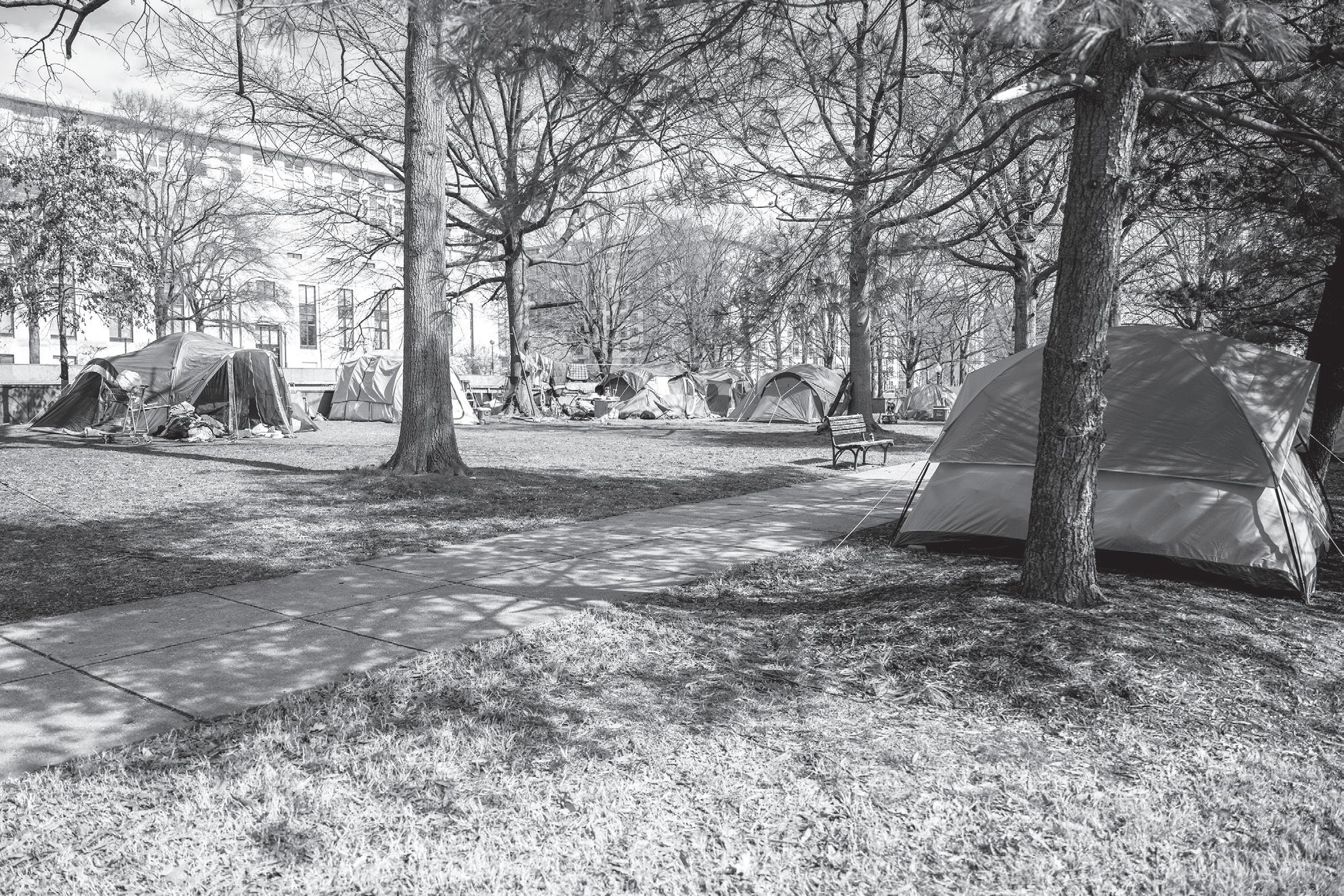
vices and doesn’t provide any new funding for housing vouchers.
Officials planned to convert The Aston, a building on New Hampshire Avenue that formerly housed a University residence hall, into a homeless
shelter by November, the first of its kind in the District and the first shelter in Ward 2. Had the city not pushed back the opening date to August due to delays in finding a provider and contract negotiations, The Aston may have pro -
Don’t lose sight of your wellbeing to excel in school
After countless over-caffeinated nights throughout finals season, nothing was more satisfying than submitting my last final paper and closing the 20 browser tabs open on my laptop. But before I could celebrate my completion of the academic year, I got sick. The sleepless nights and skipped meals had finally caught up with me. Grades matter but not at the expense of one’s health.
For many college students, school takes precedent over personal matters. For those who must maintain a certain GPA to maintain scholarships, work multiple jobs or juggle extracurricular activities, its a growing challenge to balance academics with one’s well-being, and doing so — no matter how brutal — is a badge of honor. But the grind is all too glorified in school and online — students going to class with little to no sleep, consistently burnt out or skipping proper meals, all in the name of acing that exam or finishing that paper during finals season. When we watch other students consistently sacrifice their health for school, it’s easy to compare their more destructive habits with your own. Sometimes I think that if I push forward to finish assignments when sick or sleep-deprived, I’ll have academic success. I feel more productive when finishing work if I’m under the weather or tired because the completion proves my unwavering dedication to school, at whatever cost.
But ultimately, your health is what gives you the best shot at a high GPA. Lack of sleep is proven to worsen students’ grades. Taking study breaks can be beneficial for one’s academic performance. Drinking water and eating certain foods can help your concentration and
lead to better outcomes academically.
When one’s head is in the depths of rubrics and readings, we often forget to check in on ourselves. Instead of falling into unhealthy patterns, it’s perfectly reasonable to ask for help.
I’ve requested extensions from professors, which they’ve met with understanding and flexibility. By opening up about your workload and perspective, these conversations will often make you closer with your professors. They could dismiss students as irresponsible for their poor time management skills, but most of them are more than willing to listen — they, too, remember the chaos of being a student. Many students are trying not to overburden themselves when they ask for an extension or turn in something late, not trying to shirk from work. Requesting extensions has pushed me to exercise self-compassion and concentrate more on submitting work I’m proud of.
To maintain one’s well-being, students must place boundaries between their health and academics. This could mean accepting that you don’t have the time for another extracurricular, listening to your body when you need rest or telling professors and coworkers when you need to take a break. Being a hard worker does not justify eroding your own wellness. Getting an hour of sleep shouldn’t be the prerequisite to secure an A.
As the academic year nears an end, it’s the perfect time to reflect on the habits we’ve formed in the name of education. Sleeping, eating and relaxing should not be a rare privilege, they are necessities in order to function properly and excel in academia. As my mom would tell me, “Without health, you’re nothing; all of your dreams become extinguished.”
—Andrea Mendoza-Melchor, a sophomore majoring in journalism and mass communication, is the opinions editor.
vided housing to some of the people displaced in last week’s clearing. But the shelter’s construction marks a promising first step in an approach to ending homelessness by expanding housing for those who need it.
Advocates in D.C., including Foggy Bottom and West End’s own governing body, have led the charge in urging the District to stop encampment clearings and act with policy, not sweeps, when humanitarian issues arise and per-
sist. At this moment, we must remember the University’s responsibility — and our own — to match their call.
Urban universities raise housing prices in surrounding areas, and GW is one of the largest landowners in D.C., with a past of contributing to gentrification and displacement due to its rapid real estate expansion throughout the District. A previous editorial board once stated, the University “holds the cards” to developments that direct real impacts for our neighborhood and its people. When unaffordable housing is a root cause of homelessness in the District, these encampments become GW’s concern too.
The District — and the University community — won’t be able to end homelessness in one fell swoop. But we must acknowledge our responsibility to our community by calling upon D.C.’s leaders to advocate for policy that combats homelessness in solutions without sweeps. Help support the work of housing advocates by volunteering at local shelters or food kitchens. We must come together as a neighborhood to acknowledge the humanity of our neighbors and push for a better reality for our entire community.
As we voice support for pro-Palestinian protests, we must clarify their message
As faculty members at this University, we want to affirm our support for the First Amendment right of students and faculty to engage in peaceful protest against the actions of the Israeli government in Gaza and the West Bank and against any University or other support for those actions. With D.C.’s tremendous diversity and international student populations, we must support our students as they protest in this most visible of settings on the national and world stage.
Mark Edberg Guest Contributor
W.
Douglas Evans Guest Contributor
Yet there are certain aspects of the protest narrative that must be clear so these demonstrations are not misused or misrepresented in the public eye.
First, support for Palestinian security, dignity, justice and statehood is not antisemitism. Expressing outrage at the wildly disproportionate killing of some 35,000 Palestinian civilians in Gaza, along with the continuing and illegal eviction of Palestinians from their homes in the West Bank, is not antisemitism. These messages are in fact consistent with a long tradition of Jewish support for human and civil rights, including the concept of Tikkun Olam (“repairing the world,” or actions in support of social justice).
At the same time, the increasingly charged political reaction in the U.S. to the Gaza disaster has fed a rise in both antisemitism and Islamophobia where Jewish students, as well as Palestinian and Muslim students, feel dangerously insecure. This advances no cause, except for ideologies of racism, intolerance and hate. The increasingly hostile protester vs. counterprotester dynamic only exacerbates this situation, diverting attention from the essential messages.
As faculty members with interests in public health and global development, we also want to add that Israel’s actions have created a public health disaster and an impending famine, damaging any claims the U.S. might make in the global arena about its protection of human rights. These consequences will impede future positive work that faculty and students at GW might want to conduct in these areas.
The student demonstrations at GW and other campuses specifically call for a ceasefire and university divestment in Israel as a response to the human tragedy in Gaza, along with broader statements of support for the Palestinian people and the return of stolen land. We see these protests as part of a wider recognition that Israeli policies in Gaza and the West Bank, under current Prime Minister Benjamin Netanyahu and before, are unsustainable and a violation of human rights that must change to move toward a secure and peaceful Palestinian and Israeli coexistence.
Current Israeli actions in Gaza and the West Bank will not make Israelis, and Jews in general, safer. It will almost certainly lead to the opposite result — a new layer of trauma and anger among Palestinians and renewed motivation to pursue militant action, Hamas or no Hamas. The cycle will then continue, with Israelis reexperiencing their own trauma and reacting in kind. No one wins. No one achieves peace or security.
Finally, protesters would benefit from taking a few lessons from the history of civil rights and anti-war protests: If you are facing off against law enforcement or opposing protesters, stand your ground, but do not provoke. Do not initiate any physical aggression. Do not in any way feed into public perceptions that it is student protesters who are causing violence or out of control. There are political groups who will happily provoke such reactions and make use of those perceptions for their own political ends.
We recognize that all of this is a difficult task and exhausting after more than two weeks of encampment, confrontation, and for some, arrest. If this University, and other universities, really want to fulfill their mission of education, not suppression, then it is imperative that the exchange of views is not silenced — for students or for faculty — and that concerns about reprisal do not lead to selfcensorship. GW is in the nation’s capital, where groups from across the cultural and political spectrum have historically come to be heard. GW must use these protests as a teaching moment to encourage teach-ins and discussions that broaden knowledge and compassion, not inflame divisions.
— Mark Edberg is a professor of Prevention and Community Health at the Milken Institute School of Public Health. W. Douglas Evans is a professor of Prevention and Community Health and Global Health at the Milken Institute School of Public Health.
All these messages are disrupted by any form of support for the Hamas ideology of eliminating Israel and any approval or justification for the brutal and appalling Oct. 7 attack. The separation between the two message lines must be clear: A useful pro-Palestinian message cannot be conflated or equated with support for Hamas.
THE GW HATCHET May 20, 2024 • Page 6
eic@gwhatchet.com news@gwhatchet.com opinions@gwhatchet.com photo@gwhatchet.com sports@gwhatchet.com culture@gwhatchet.com copy@gwhatchet.com multimedia@gwhatchet.com 609 21st St. NW Washington, D.C. 20052 gwhatchet.com | @gwhatchet Submissions — Deadlines for submissions are Friday 5 p.m. for Monday issues. They must include the author’s name, title, year in school and phone number. The GW Hatchet does not guarantee publication and reserves the right to edit all submissions for space, grammar and clarity. Submit to opinions@gwhatchet.com Policy Statement — The GW Hatchet is produced by Hatchet Publications Inc., an independent, non-profit corporation. All comments should be addressed to the Board of Directors, which has sole authority for the content of this publication. Opinions expressed in signed columns are those of the authors and do not necessarily reflect the view of The GW Hatchet. All content of The GW Hatchet is copyrighted and may not be reproduced without written authorization from the editor in chief. Cost — Single copies free. Additional copies available for purchase upon request. Grace Chinowsky, editor in chief Hatchet The GW Faith Wardwell, managing editor Ianne Salvosa, managing editor Cristina Stassis, managing director Nikki Ghaemi, community relations director Fiona Riley, senior news editor Rachel Moon, senior news editor Hannah Marr, news editor Jennifer Igbonoba, news editor Rory Quealy, news editor Jenna Lee, assistant news editor Molly St. Clair, assistant news editor Tyler Iglesias, assistant news editor Brooke Forgette, contributing news editor Ella Mitchell, contributing news editor Sachini Adikari, contributing news editor Ryan J. Karlin, contributing news editor Andrea Mendoza-Melchor opinions editor* Madie Turley contributing opinions editor* Paige Baratta, editorials assistant* Dylan Ebs, research assistant Jackson Rickert, research assistant Fiona Bork, development assistant Lizzie Jensen, podcast host – news Max Porter, podcast host – news Abby Keenley, design editor Anusha Trivedi, design editor Mollie Weiner, contributing design editor An Ngo, graphics editor Ethan Valliath, social media director* Max Gaffin, social media director Anaya Bhatt, contributing social media director* Cade McAllister, business manager * denotes member of editorial board Sandra Koretz, sports editor Ben Spitalny, sports editor Syd Heise, sports columnist Ryan Jainchill, basketball editor Nick Perkins, culture editor* Caitlin Kitson, contributing culture editor Sage Russell, senior photo editor Daniel Heuer, assistant photo editor – news Lexi Critchett, assistant photo editor – news Jordyn Bailer, assistant photo editor – sports Jordan Tovin, assistant photo editor –culture Kaiden J. Yu, assistant photo editor –features Nicholas Aguirre Zafiro, video editor Anna Fatizzo, copy editor Lindsay Larson, copy editor Shea Carlberg, copy editor Carly Cavanaugh, research assistant*
Andrea Mendoza-Melchor Opinions Editor
NYLA MOXLEY
GWHATCHET.COM/OPINIONS
University turned out to be another place where racial biases made romance inaccessible to me and other people of color.” —
on 5/13/24 FROM
DANIEL HEUER | ASSISTANT PHOTO EDITOR
The Triangle Park encampment, pictured in March before officials’ recent clearing.
CULTURE
Piano professor looks back on worldwide tours throughout history
MAX JACKSON REPORTER
International concert pianist
Malinee Peris has witnessed history wherever she performs.
Peris, a professor of piano at GW, brought her music to countries around the globe — including World War II era London and a divided Berlin — while touring during her nine decadeslong career. On top of the historical events she’s observed on her tours, Peris said she has seen the GW music department evolve from a small townhouse to a larger program since first starting her position at GW in 1970.
“The changes have not been only in GW,” Peris said. “I think the changes have been everywhere. Some of it, I think, very good. Some things that needed to be changed for years. The idea that as a woman, you could let your opinion actually matter.”
Before she began her international touring or her tenure teaching at GW, the 94-year-old concert pianist said her passion for music and performance began during her childhood in Sri Lanka, where she grew up under British colonial rule.
She said her mother, a piano teacher, started teaching her at age 4. Peris performed her first piano recital at age 12, which she said revealed her affinity for playing.
“From then it was understood that I would be playing the piano, probably teaching the piano, and probably be a better music teacher than my mother — probably earning a little bit more,” Peris said.
She said she received a scholarship to go to the Royal College of Music in London, but her family could not afford to send her to Europe. She said her father got The
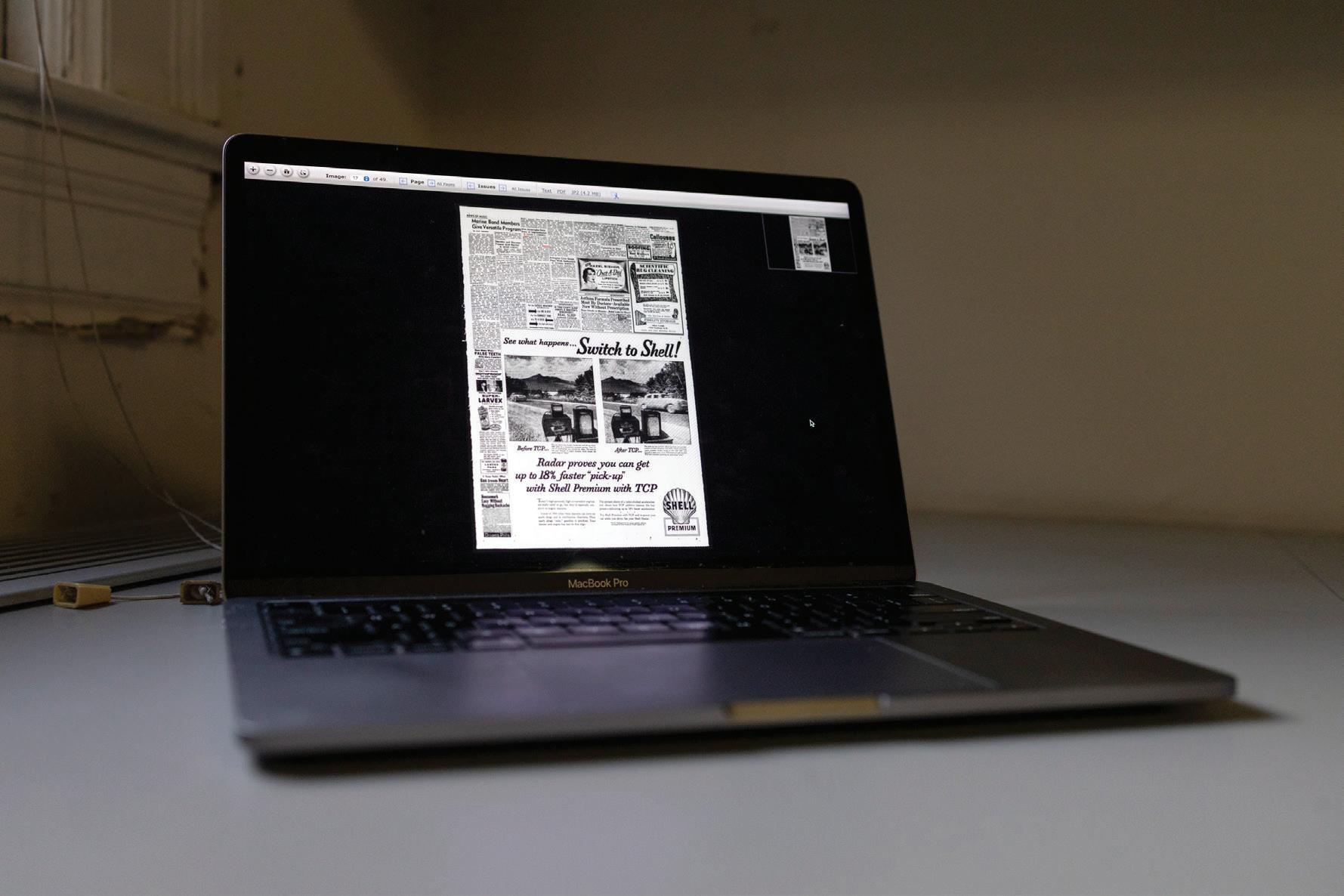
Times of Ceylon, a local Englishlanguage paper, to establish a donation-based scholarship to pay for her 21-day steamship voyage, even though she initially objected.
“I hated the idea,” Peris said.
“Because all I could think of was ‘God, everybody will now know that I am poor. Everybody will think I am poor.’”
Peris said she ultimately agreed to the scholarship and moved to London. Her college years overlapped with the end of World War II, and she said submarine sightings and air raid sirens were still
happening in England upon her arrival to London. She said during college, she was under constant “press scrutiny” because newspapers from back home continued to report on her.
“There was no option of doing badly,” Peris said. “I mean, I had a personal responsibility to a whole people who contributed from 50 cents upward.”
After graduating, Peris’ touring career began against the backdrop of postwar Europe. She said her first postwar piano competition was in Warsaw, Poland, in 1955 and
Here’s how to make the most of your summer in DC
NICK PERKINS CULTURE
EDITOR
Campus is emptying out, the sun is blaring down and the monuments are full of tourists — in other words, summer has begun in the District.
But not all GW students depart for a three-month vacation. Many stick around to work internships and other odd jobs in D.C., confused without their classes and friends to give them structure. If you’re one of those lost souls, meandering down sidewalks in hopes of encountering someone you know or something to do, follow these D.C. summer tips and tricks to get the most of your break in the District.
Take advantage of campus
GW’s campus is dead over the summer — a vast majority of students are home, and the influx of summer Hillterns doesn’t overwhelm Whole Foods and Tonic in the same way. It might be hard seeing everyone you know abandon you to go home, but the absence of students can be a blessing in disguise as campus becomes your personal backyard.
The swinging benches on campus are seemingly always stuffed with students during the year, but over the summer they’re free for all your outdoor reading
needs. Or you can venture out to the Vool, or Mount Vernon Campus pool, and go for a dip to escape the hot sun. Enough people stay on the Vern during the summer that you might even be able to find someone to tag along, an eternally hard task for any activity involving a Mount Vernon Express ride.
Do a Metro day trip
The suburbs of D.C. aren’t quite as exciting as the city itself — that’s kind of the point of suburbs — but the more relaxed environments can provide a necessary respite from the hustle and bustle of the District.
Try riding the Metro into Alexandria, Virginia, for a day, and wander Old Town, grabbing ice cream at The Creamery right on the water or New Haven-style pizza at Frank Pepe’s. Or head north into Glenmont, Maryland, and absorb Wheaton Regional Park, a massive array of gardens and greenery.
Have an umbrella on you, always
The most infamous part of the District’s summer weather is the humidity, and there’s no reason to pretend as though it’s even remotely tolerable. But what’s lesser known yet equally intimidating is the tendency for a blue sky to morph into the hardest rain storm you’ve ever experienced. The storms tend to be brief, but do yourself a favor
and keep an umbrella by your side whenever you go out. It saves you the embarrassment of sheepishly tapping your GWorld in front of residence hall security soaked in rain.
Just keep walking and walking
There’s so much more to the District than Foggy Bottom — the neighborhood, full of its corporate buildings and sterile tourist restaurants, doesn’t even come close to capturing the range of communities in the city. With extra time on your hands during the summer, there’s no reason to not try to find your new favorite D.C. neighborhood.
To really learn the streets of D.C., it’s best to walk them. To sojourn in the District’s many quadrants, you can stroll alongside the National Mall in Eastern Market, a northeast neighborhood decorated with ice cream stores, upscale restaurants and local farmer’s market stalls.
If you feel like going to the direct opposite area of campus, venture to Anacostia. The area is rich with local and national history through the neighborhoodfocused Anacostia Community Museum, and Cedar Hill, the red-roofed house that Frederick Douglass once lived in. Once everyone comes back from their summer voyages, you’ll be a regular D.C. tour guide.
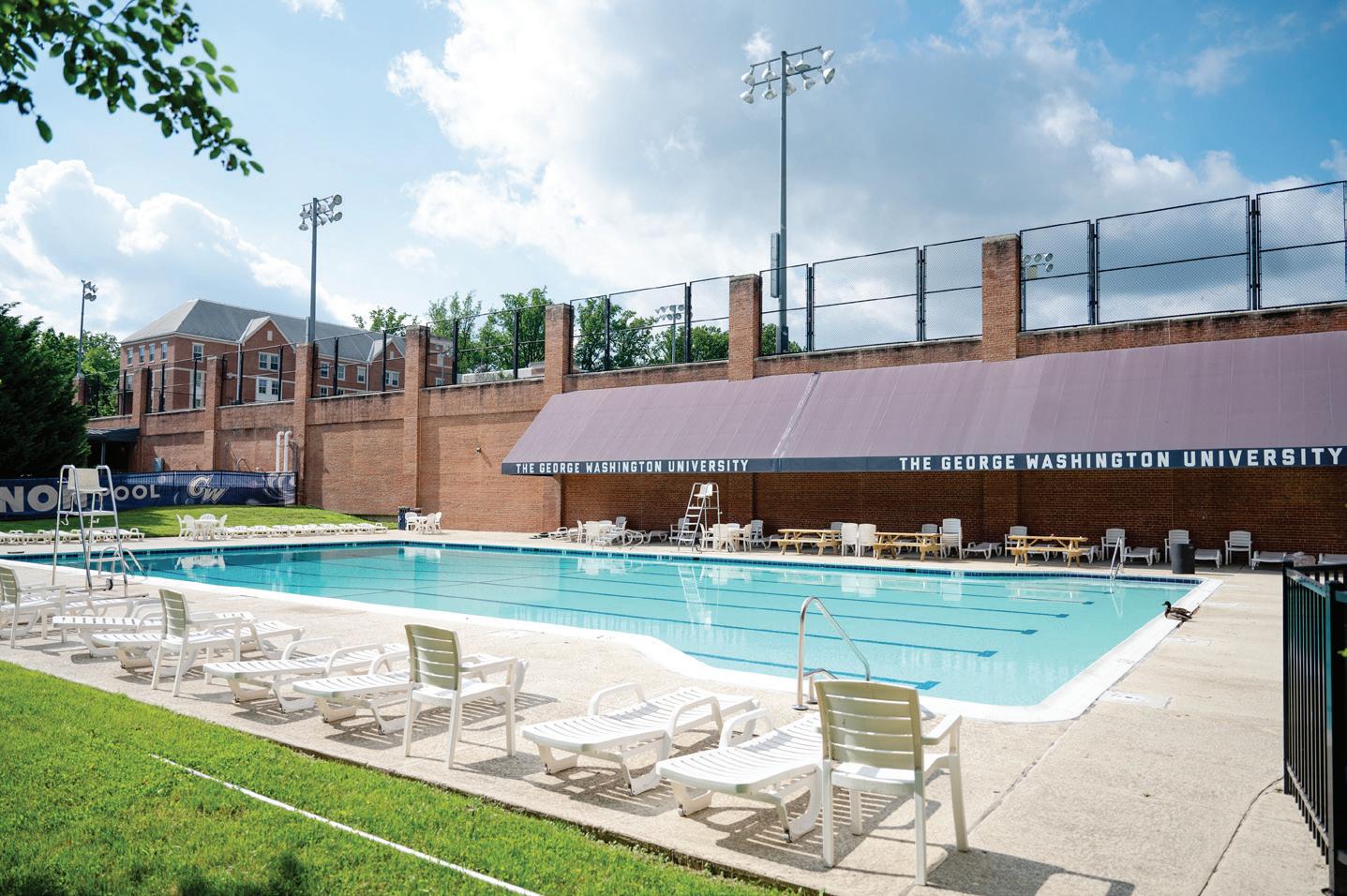
she also performed in cities like Dresden, Germany, which had experienced heavy bombing during the war.
“The world was opening up,” Peris said. “Everything was in rubble. Europe was in rubble. I played all over, with management sending me all over the Russian Empire.”
Peris said she saw Eastern Europe’s shifting political landscape on her tours there and that borders and city names were constantly changing as Soviet-backed governments collapsed. She said political
tensions didn’t hinder her tours as she played concerts on either side of the Berlin Wall.
“Both the American officers at Checkpoint Charlie and the East German officers at Checkpoint Charlie, on the other side, used to wave me and say, ‘Hi, you again?’” Peris said.
Peris said her tours took her outside Europe to countries like China and Israel. When China’s Ministry of Culture hosted her for several concerts, she said she played in several cities including Shanghai, Beijing and Nanking.
“I was also representing Sri Lanka in a way,” Peris said. “They were quite friendly with China, so I was taken to see, you know, they gave me a car and they took me by the arm and I walked along the Great Wall.”
Peris also performed in the District, even before she was a GW professor, making her stateside debut in 1956 at the National Gallery of Art. A Washington Evening Star review by Frank C. Campbell called her performance among the most “imaginative” he had seen in a long time.
“The young pianist’s technique is not absolutely immaculate, but it is powerful,” he wrote.
Peris said she stopped touring in the 1990s, but her legacy lives on back home. She said she will give two concerts in Sri Lanka and offer a cash prize to the country’s highest scorer on music exams each year.
“Strangely, I find when I go back to Sri Lanka now, if I play or if I don’t, I’m still in headlines,” Peris said. “And that is 50 years or 60 years, some years after, a second generation after, which amazes me.”

Monster trucks, politics: The new movies to screen this summer
CAITLIN KITSON CONTRIBUTING CULTURE
EDITOR
LINDSAY LARSON STAFF WRITER
NICK PERKINS CULTURE EDITOR
With swarms of moviegoers decked out in pink and viral memes dominating every social media feed last year, it’s hard to top the Barbenheimer phenomenon of summer 2023. But this summer’s lineup of dynamic blockbusters and captivating indie flicks could give “Barbie” and “Oppenheimer” a run for their money. From high-budget prequels and sequels to a film festival of documentaries investigating domestic and international political issues, here are our picks for which films are worth a trip to the cinema this summer.
“Furiosa: A Mad Max Saga” – May 24
With all the key elements from the 2015 film “Fury Road” returning to this summer’s prequel, “Furiosa: A Mad Max Saga” promises to be a worthy follow-up. “Fury Road,” directed by George Miller, is two hours of nonstop car shoot-outs and races through the desert. There’s literally a character whose exclusive role is to play heavy metal electric guitar
during fight scenes. At the center of that film is Furiosa, a monster-truckdriving warrior played by Charlize Theron. In “Furiosa,” releasing Friday, Anya Taylor-Joy takes on a younger version of Furiosa, 45 years after the collapse that created the series’ apocalyptic wasteland setting. After a horde of bikers kidnaps her from her home, Furiosa sets off on a gasoline-fueled path of vengeance against the warlord Dementus, the leader of the bikers played by Chris Hemsworth, and tries to find her way back to her family.
“Inside Out 2” – June 14
Disney is again offering moviegoers a chance to steep their summers in emotions with the sequel to its 2015 film “Inside Out,” releasing on June 14. Like its predecessor, “Inside Out 2” will follow the central emotions — Joy, Sadness, Fear, Disgust and Anger — that govern the life of a young girl named Riley, two years after the events of the first film. But as Riley turns 13 and heads off to hockey camp, four new, more complicated emotions arise: Anxiety, Envy, Embarrassment and Ennui — a feeling of boredom, dissatisfaction and tiredness.
Riley’s struggle to navigate the new feelings will be relatable for anyone who experienced the trials and
tribulations of growing up in the nine years since the first film’s premiere. This summer, new and old fans alike shouldn’t miss “Inside Out 2.”.
“MaXXXine” – July 5
Spanish director Pedro Almodovar has called sex and death “eternal themes” in cinema, and if the first two films in his “X” trilogy are any indication, filmmaker Ti West has taken Almodovar’s idea to heart. In “MaXXXine,” the third movie in the trilogy following 2022’s “X” and “Pearl,” West reunites with up-andcoming actress Mia Goth in a crime noir set in the 1980s Los Angeles underground adult film scene.
“MaXXXine” picks up where “X” left off, with Goth’s Maxine finally breaking out as a Hollywood star, as the investigation into the Night Stalker — a serial killer terrorizing Los Angeles, California — starts to connect to her troubled past. West and Goth’s first two collaborations bridged genres from slasher to borderline porno parodies to intense psychological thrillers. Given the sheer quantity of ideas bouncing around in the “MaXXXine” trailer, featuring famed LA killers and debates over which rando actors kickstarted their careers out making horror movies, the new film, releasing July 5, promises West’s signature blend of styles.
THE GW HATCHET May 20, 2024 • Page 7
NEW
ALBUM:
THE SCENE RELEASED THIS WEEK: MARYLAND PLANT FEST May 25 to May 26 Plants Alive! in Silver Spring, MD | Free ADAMS MORGAN MOVIE NIGHTS 2024 May 21 Marie Reed Elementary School Soccer Field | Free
“HIT ME HARD AND SOFT” BY BILLIE EILISH
PHOTO ILLUSTRATION BY JORDAN TOVIN | ASSISTANT PHOTO EDITOR
A moviegoer buys popcorn before enjoying a film.
ARWEN CLEMANS | STAFF PHOTOGRAPHER
The Mount Vernon Campus pool.
PHOTO ILLUSTRATION BY SAGE RUSSELL | SENIOR PHOTO EDITOR
The 1956 Evening Star article that called Malinee Peris’ performance “imaginative.”

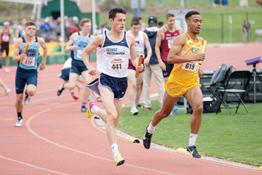
Student-athletes call for mental health support amid fundraising push for services
SANDRA KORETZ SPORTS EDITOR
After the hiring of the University’s first studentathlete mental health specialist this semester, athletes reported a need for additional mental health support from the Athletics Department.
The University hired Director of Student-Athlete Mental Health Jordan Butler this past January and launched a campaign last week to raise money for additional resources for athlete mental health, stating that the student demand for support is “much higher” than what current staff can maintain. Athletes said the University needs to hire more specialists, especially those of diverse backgrounds, to ensure that all athletes can use the department’s resources in the future.
Butler currently offers athletes drop-in chats and private therapy sessions as the designated mental health adviser for 390 studentathletes. The Athletics Department’s campaign, titled “Rev Up Mental Health” spans from May 15 to May 31 with the goal of raising $25,000 to expand mental health services at the University. A promotional campaign video for the fundraiser did not specify
what the expanded services would consist of.
An Athletics Department official deferred requests to interview Butler to comments from officials in the campaign video. As of Sunday, the campaign had raised $1,018, about 4 percent of officials’ desired target, with more than a week left in its run.
“I think that athletes face unique stressors, whether that’s injuries, surgeries,” Butler said in the campaign’s promotional video. “But I also think that athletes handle it in unique ways, and they try to apply what has made them successful on the court, the pool or whatever their venue is, to major depressive disorder or other things and that is what can make things exponentially worse.”
Suicide rates among college athletes have doubled within the past 20 years, now standing as the second most common cause of death in university athletes. After Butler’s schedule filled up immediately following his January hiring — some students claiming an immediate appointment and others remaining on the waitlist for weeks — he launched additional drop-in hours to make his resources more widely available, athletes said. Since late
January, Butler has hosted the drop-in hours in the Champions Club within the Smith Center for 90 minutes twice weekly.
“His caseload is full,” said sophomore soccer player Alana Beasley. “So, you just have to wait until his caseload is not full.”
Volleyball freshman Loukia Papadakos said she began meeting with Butler through one-on-one therapy sessions shortly after his arrival at GW, when she was sidelined due to a concussion and wanted to not only focus on her physical but also her mental health before returning to the court this fall.
Papadakos said she was initially nervous to met with Butler but continued to meet with him. She said she’s ultimately thankful for their conversations and their benefit to her well-being on and off the court.
“At first, I was like, ‘Wait, I really don’t know if I want to continue this,’” Papadakos said. “But then I realized that the personal growth that I’ve been making, and my being comfortable with feeling and talking about emotions, it’s just improved so much.”
Men’s basketball redshirt freshman Garrett Johnson said Butler spoke with his team shortly after he was hired, and said those
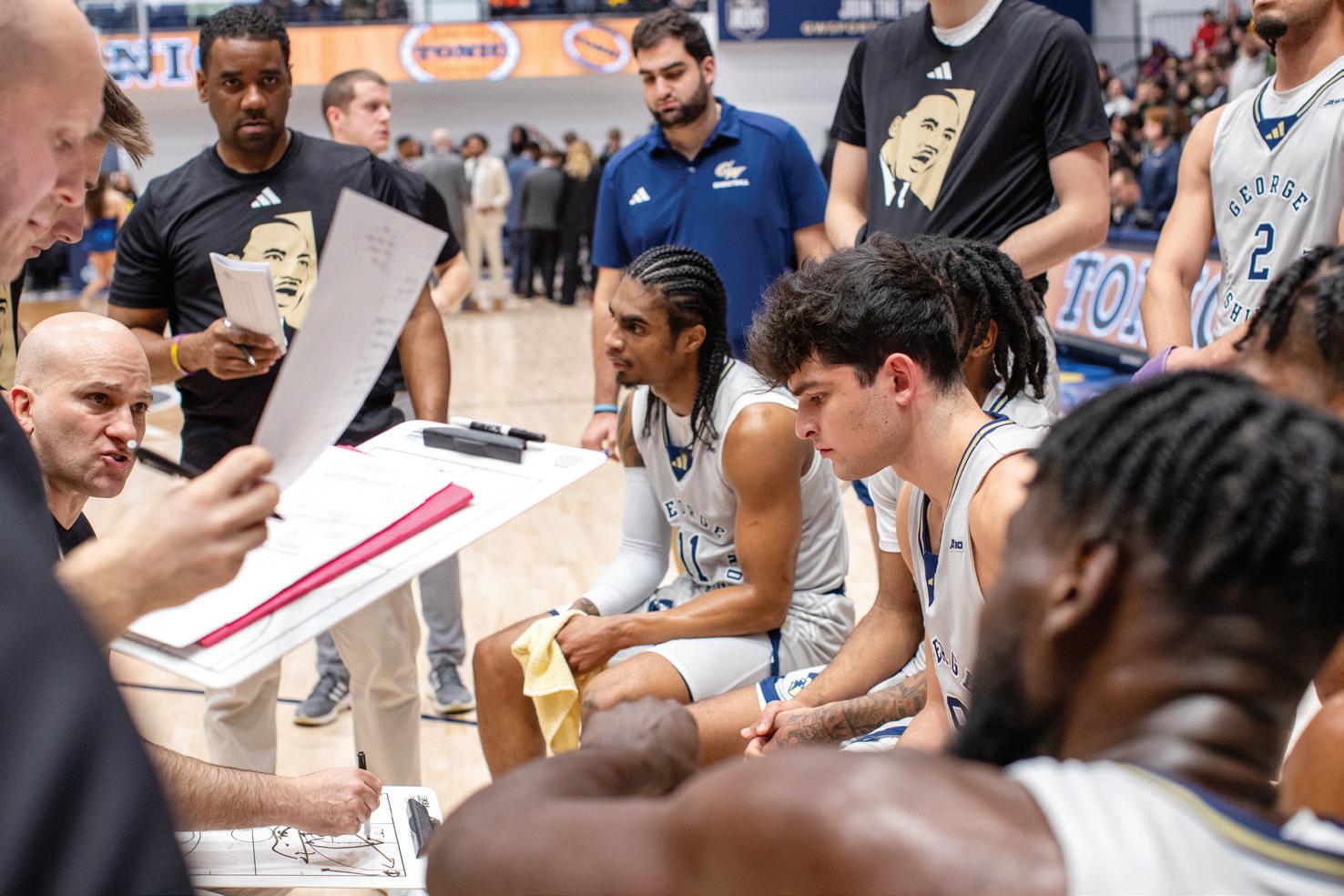
conversations should happen among with other athletic teams at the University. The women’s lacrosse team also met with Butler this semester where he reviewed resources after being invited to speak with the team, one athlete said.
“When he talked to us, he gave us a pretty deep rundown of everything,” Johnson said. “So I think they should do that with every team at a minimum probably. They could
Column: GW’s plan to fill the Smith Center pool left some athletes in the deep end
The fate of the Smith Center swimming pool has treaded water for the past eight months following officials’ announcement of plans to replace the pool with an additional basketball court and exercise facility in September. The University called off the proposal last month after architects and designers discovered the project to be more invasive and costly than originally predicted as they proceeded with zoning applications.
Men’s and women’s basketball head coaches and athletic director Tanya Vogel said the planned construction wouldn’t serve “anyone’s best interests” when they emailed alumni, donors and fans to announce the change in plans. They got that right.
Swimmer Julia Knox started a petition against the construction in late March that garnered more than 3,000 signatures, demanding officials halt their plan until they secure a “suitable alternative” pool space. Vogel herself said that the Smith Center pool, which is smaller than Olympic-size regulations, is “insufficient” as the current venue for “high-quality, championshiplevel programs.” Given that the pool in the Lerner Health and Wellness Center has three lanes — not enough for the roughly 50 swimming and diving team members that would use it — and the Mount Vernon Campus outdoor pool does not have diving boards, swimmers would’ve likely had to shuttle to off-campus venues for practices after the demolition, which might’ve created unforeseen cost and transportation issues for the team.
GW swimming and diving, the winningest program at GW right now, has won nine Atlantic 10 Championships since 2017, with multiple individuals competing in the NCAA championships. Simply put, the team’s facilities — the pool at Smith Center and the options for venues after the planned demolition — don’t match the program’s success.
Granted, extra practice facilities might have been helpful for the basketball program after disappointing 2023-24 seasons, in which the last-in-conference men’s basketball saw a 12-game losing streak and the women’s team struggled to break .500

in A-10 play. Both basketball teams were knocked out of the A-10 tournament in the first round as swimming and diving continued a seven-year winning streak. But with the state of their facilities, it was also reasonable for reigning A-10 champion swimmers to scowl at GW’s proposal to demolish their already “insufficient” pool to give losing basketball teams a boost.
GW’s most profitable sport is undeniably basketball. The sport’s fanfare is essential to the school’s athletic culture and funding. The men’s basketball team generates $4,916,917 annually, according to the U.S. Department of Education, and women’s basketball follows behind with about $3,627,748 in revenue. The swimming and diving team’s revenue is not disclosed, but the combined $8.5 million from our basketball teams is more than half the $15.9 million brought in by all other sports combined. Though basketball’s success this season is not evident in the record book, it likely is in the checkbook. It’s only fair that the University makes decisions that are advantageous for the athletes who bring home the bacon for the department. Regardless of the benefits of the plan to one team or another, the premature announcement to demolish the pool left all sides of the athletics community with empty promises, frustration and avoidable stress. When officials abandoned the plan, they said GW and the Athletics Department would explore “alternative approaches” to deliver a practice facility for basketball programs, and will continue to “seek options for an improved pool experience,” with the Smith
Center pool remaining the team’s home base. Officials acknowledged the “very challenging situation” at hand but didn’t do much to address the weight of its actions — the construction and the proposal’s reversal — on some of the school’s highestachieving athletes. When the pool demolition was announced, multiple swimmers entered the transfer portal. Some players decided to remain in the portal to avoid the risk of scholarship reduction if they were to return to GW when officials subsequently abandoned their decision. Swimmers said last month that there were “double-digit” postseason entrances into the transfer portal, compared to zero in years prior. Vogel announced swimming and diving Head Coach Brian Thomas’ resignation earlier this month, washing the team in more uncertainty. In the wake of the controversial plan and its reversal, GW must throw in the life raft to support its highest-earning and highest-achieving teams. The University needs to win back the trust of the swimming and diving program: Find a new coach, new prospects to make up for transfer portal losses and a way to compromise with a deserving team. For the basketball team, officials must reevaluate their priorities. The team’s revenue is essential to GW’s athletic success, and if players need updated facilities to be competitive, the school should provide them. But not at the expense of other teams. For now, officials won’t destroy any pools or construct any basketball courts. Instead, GW can build something else: a culture of transparency, inclusivity and responsible decision making.
probably make it a little more known that it’s there. I feel like that’s a good stepping stone at least.”. Tim Nicholson, a junior on the baseball team and the Student-Athlete Advisory Committee finance chair and baseball representative, said he has battled anxiety and depression since high school, which have been driving forces in his desire to seek expanded mental health resources at GW. He said the improvements he saw in
his own mental health after receiving help from one-onone sessions with specialists outside of GW emboldened him to advocate for other athletes to seek the support they need.
“It would be nice to have some sort of specific tool that you can use to deal with that anxiety,” Nicholson said. “The problem is that it’d be hard to get interest in student-athletes needing this because the stigma around it being weird or not common.”
Law school alum vies for spot in Paris Olympics
SANDRA KORETZ SPORTS EDITOR
GW Law alum Ema Klugman seeks to represent Australia at the 2024 Paris Olympics in three-day eventing, an equestrian competition.
Klugman, who graduated from GW Law School with a juris doctorate Sunday, sits on a list of eligible competitors who are all contending for the three spots on Team Australia’s three-day eventing team. If the selection panel — which is required to select the team by July 1 — chooses Klugman to represent Australia, she will join the legacy of at least 10 other GW alumni who have competed for their respective countries in the Olympics.
Alum Elana Meyers Taylor medaled in bobsledding in the 2010, 2014 and 2018 Olympics while representing the United States. Men’s basketball alum Yuta Watanabe represented Japan during the last summer Olympics in 2021 on his home soil, during the 2020 Summer Olympics.
Klugman said she has been a member of the High Performance Squad, an Australian national equestrian group, for several years and her successful performances on the international stage have led to her inclusion on the list of potential Olympians for Team Australia.
“My sport is a bit different in the sense that I’m an athlete, but also, there’s another very big part of the equation, which is that the horse is the other athlete that we so heavily rely upon, and a huge amount of time and effort and energy goes into taking care of the horses,” Klugman said.
The National Federation and the Australian Olympic Committee selects Olympians for three-day eventing from a “Long List” of prospective athletes, and nominees to Team Australia must pass criteria like having Australian citizenship, satisfying the “Qualification System” to compete in the games.
Throughout her career, Klugman has achieved three A-level ratings, the
highest national ratings, in dressage, traditional and showjumping between 2015 and 2019 and is one of two people in the United States to achieve the distinctions. Klugman also earned the Top Young Rider award at the Kentucky 5* in June 2021. While riding her horse named Bronte Beach, Klugman earned a five-star status when competing earlier this month.
Klugman, who was born to Australian parents, grew up in Nairobi, Kenya, where she learned to ride horses and gained an appreciation for the sport. She said she also lived in and competed in equestrian events in Australia, eventually gaining support from the Australian Federation where she maintained a high performance track through the Australian team.
Klugman said in a message that she began competing in the U.S. at the age of 10.
“I could hypothetically switch to America if I wanted to, at some point. But I feel fairly loyal to Australia,” Klugman said.
Klugman said she trains six days a week, driving an hour to Clarksburg, Maryland, from Foggy Bottom to her family’s Snowy River Farm to train and ride her horses. She said the farm’s proximity to GW was a factor in her decision to attend GW Law.
Klugman said she spends approximately 50 hours a week grooming, feeding and training her horses. Alongside Bronte Beach, Klugman said she also competes on two other horses names RF Redfern and Slieve Callan Alpha.
During her time at GW Law, she said she structured her some of her course schedule around her competition schedule. Klugman added that she passed the Virginia bar exam in February, prior to the start of her competition season.
“So it’s a lot of scheduling and kind of planning around,” Klugman said. “I’m going to really have to focus on school in these particular times, and so I’m not going to be able to do a competition that maybe I would have done otherwise.”
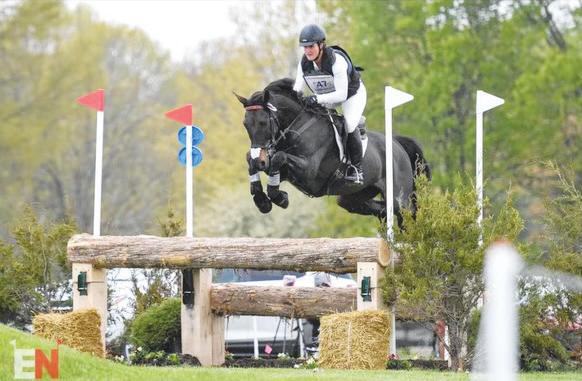
NUMBER CRUNCH
GAMES OF THE WEEK THE GW HATCHET May 20, 2024 • Page 8
Baseball’s batting average, good for third in the A-10 .298
MEN’S CROSS COUNTRY AND TRACK AND FIELD May 22 | 3 p.m. The team travels to the NCAA Outdoor East Regional in Kentucky. BASEBALL May 21 | 3 p.m. Baseball begins their A-10 Championships against Richmond at 11 a.m. in Tysons, Virginia. SYD HEISE SPORTS COLUMNIST
SAGE RUSSELL | SENIOR PHOTO EDITOR
Men’s basketball redshirt freshman Garrett Johnson looks down during a timeout in a January game.
COURTESY OF EMA KLUGMAN
GW Law alum Ema Klugman rides her horse as it jumps a hurdle during competition.
HATCHET FILE PHOTO
The G Street entrance to the Smith Center.
SPORTS






















